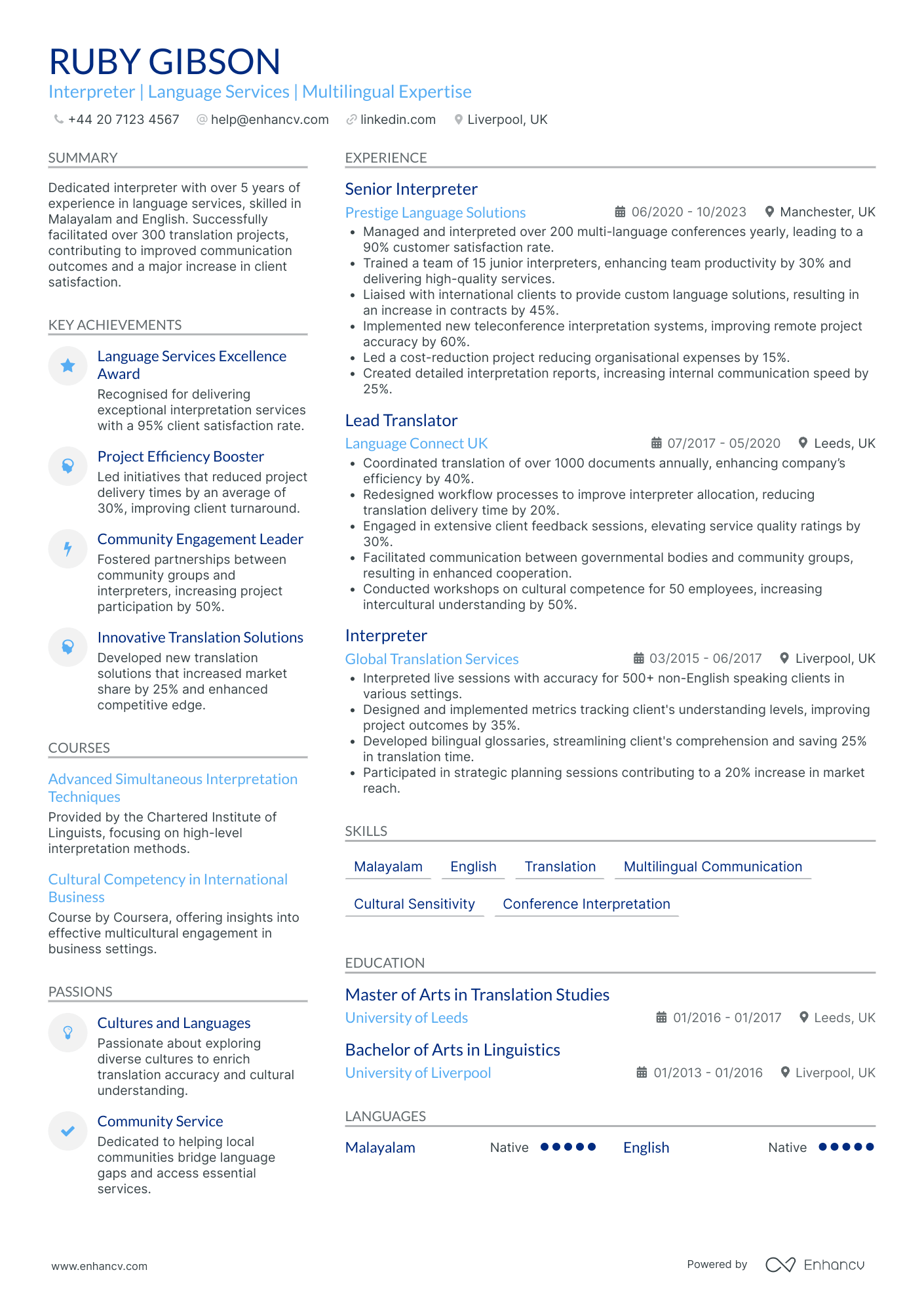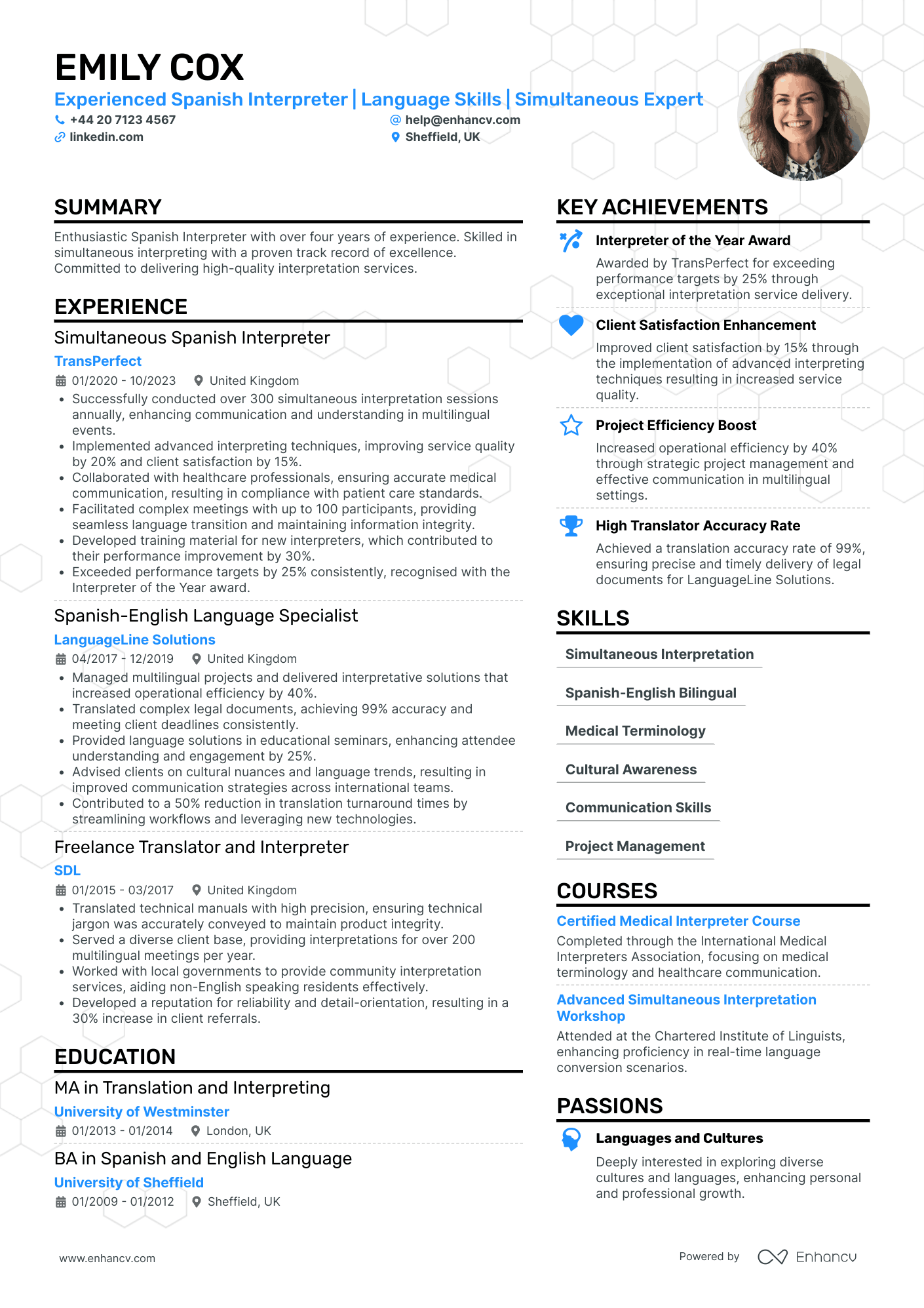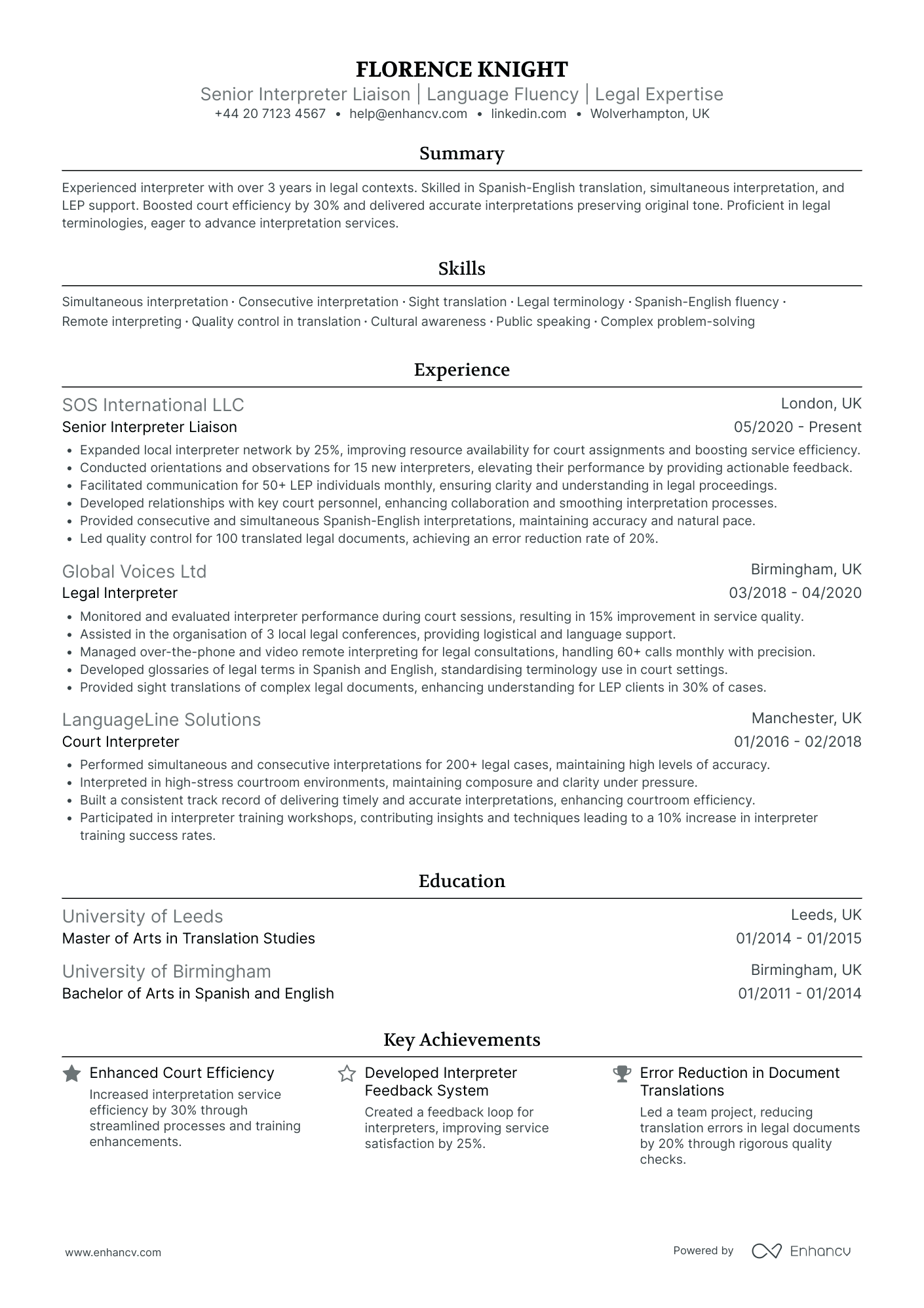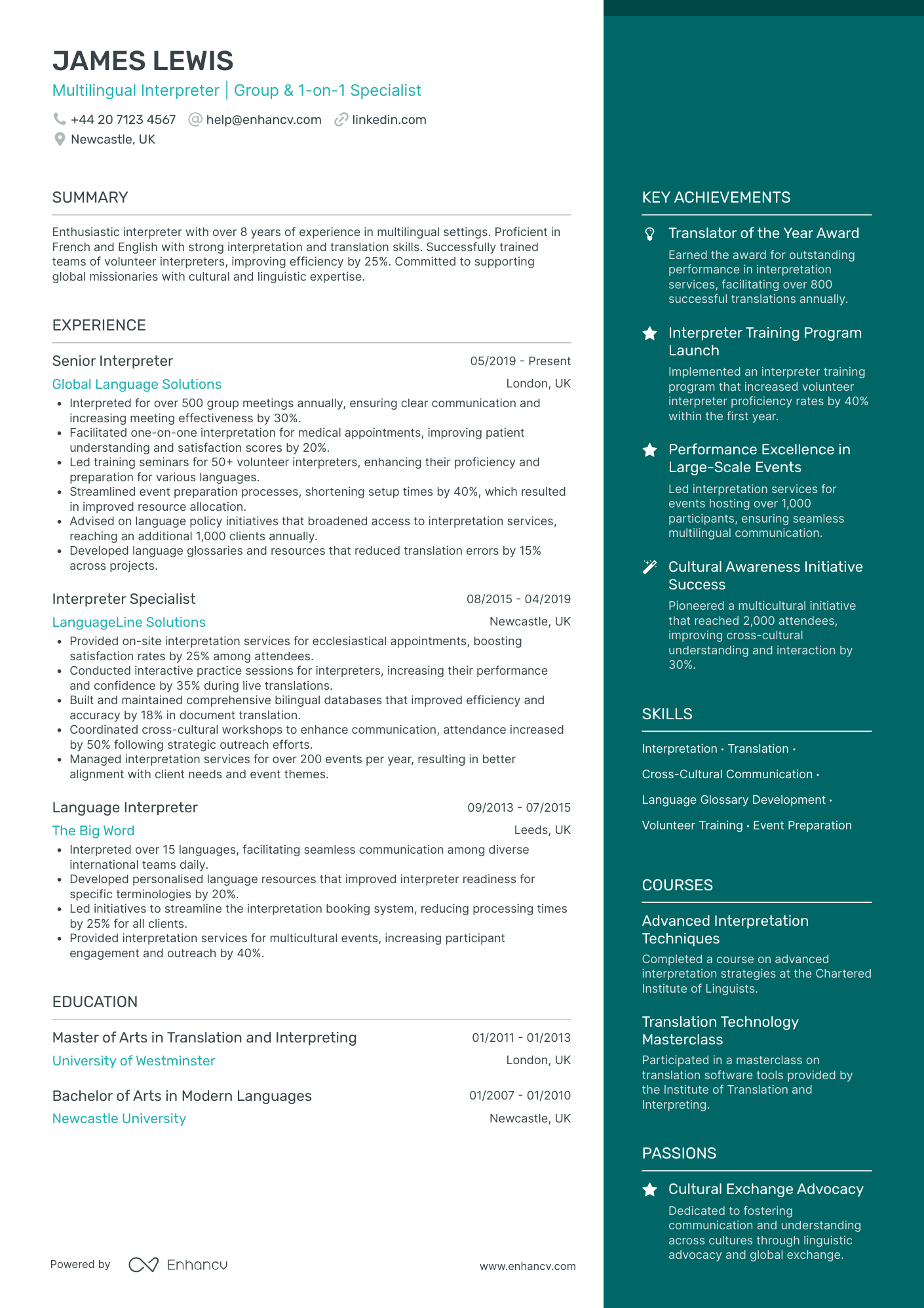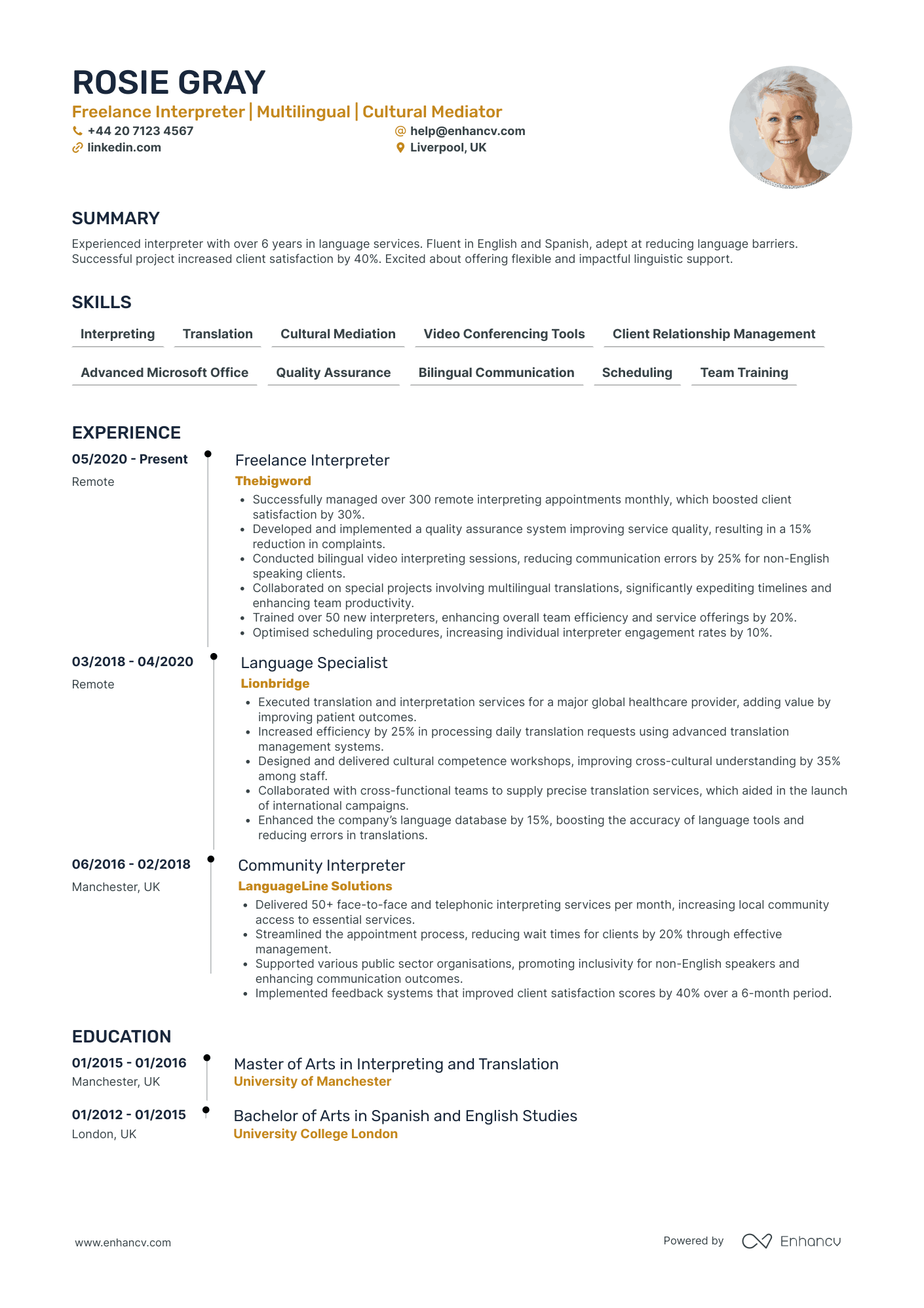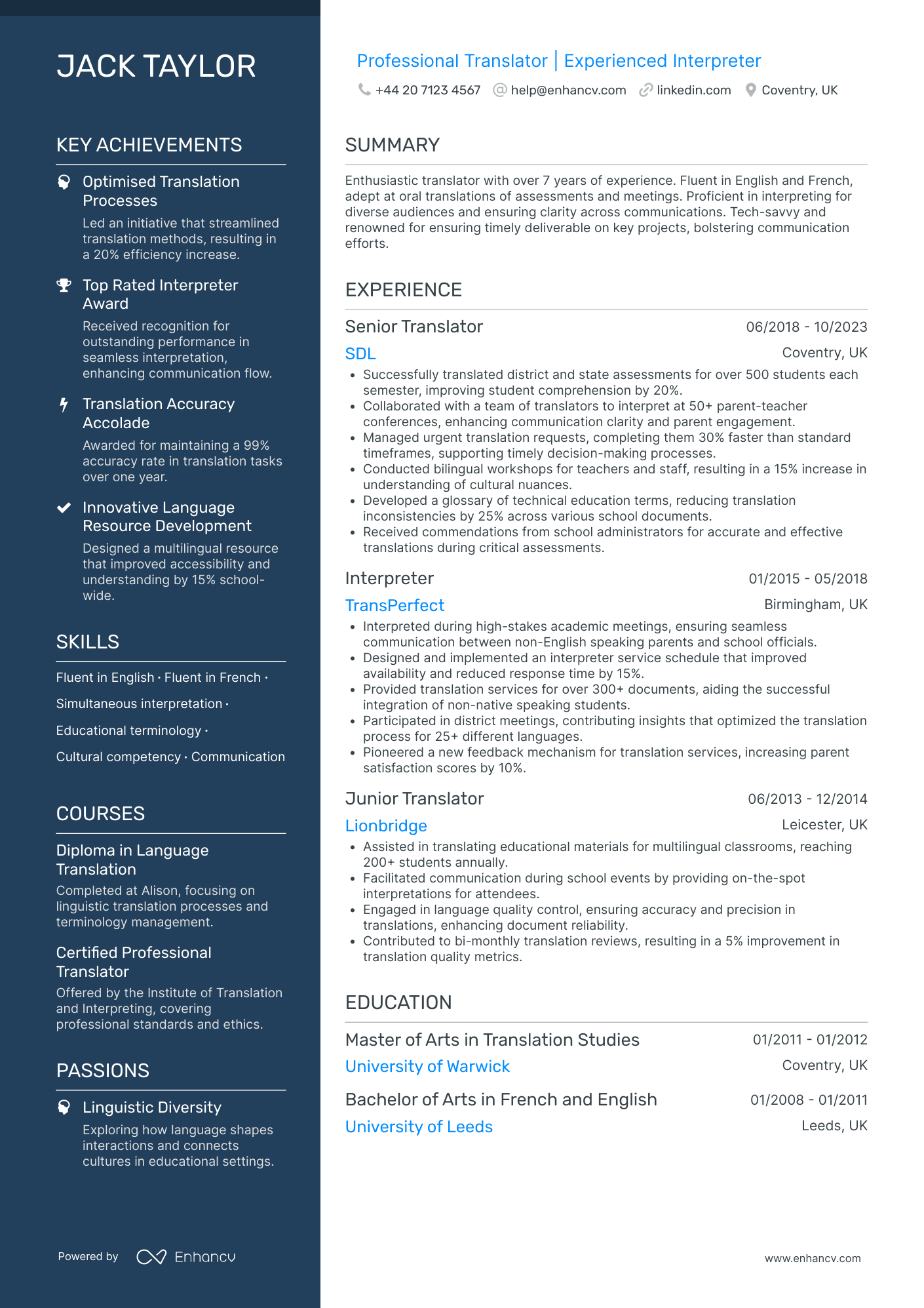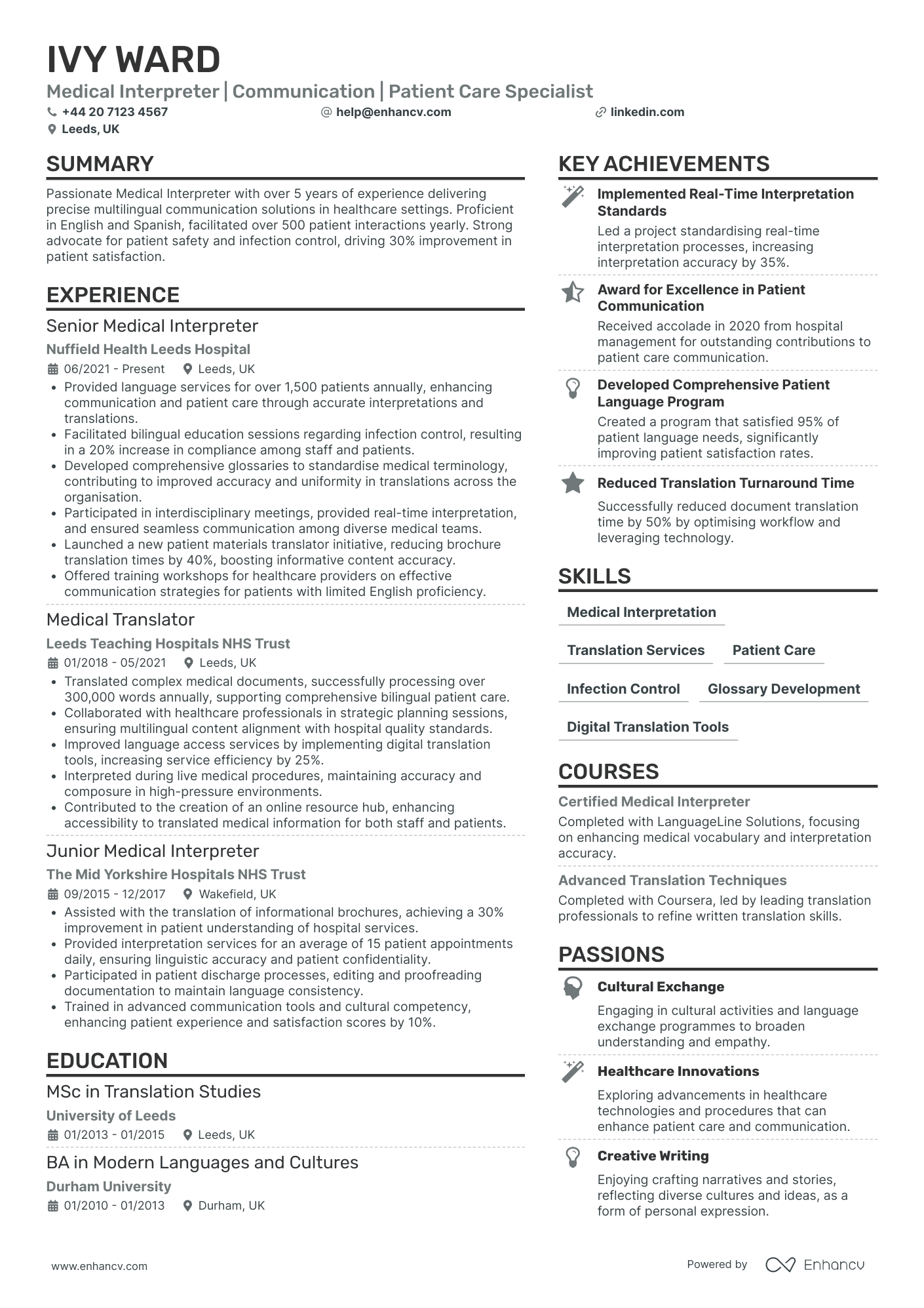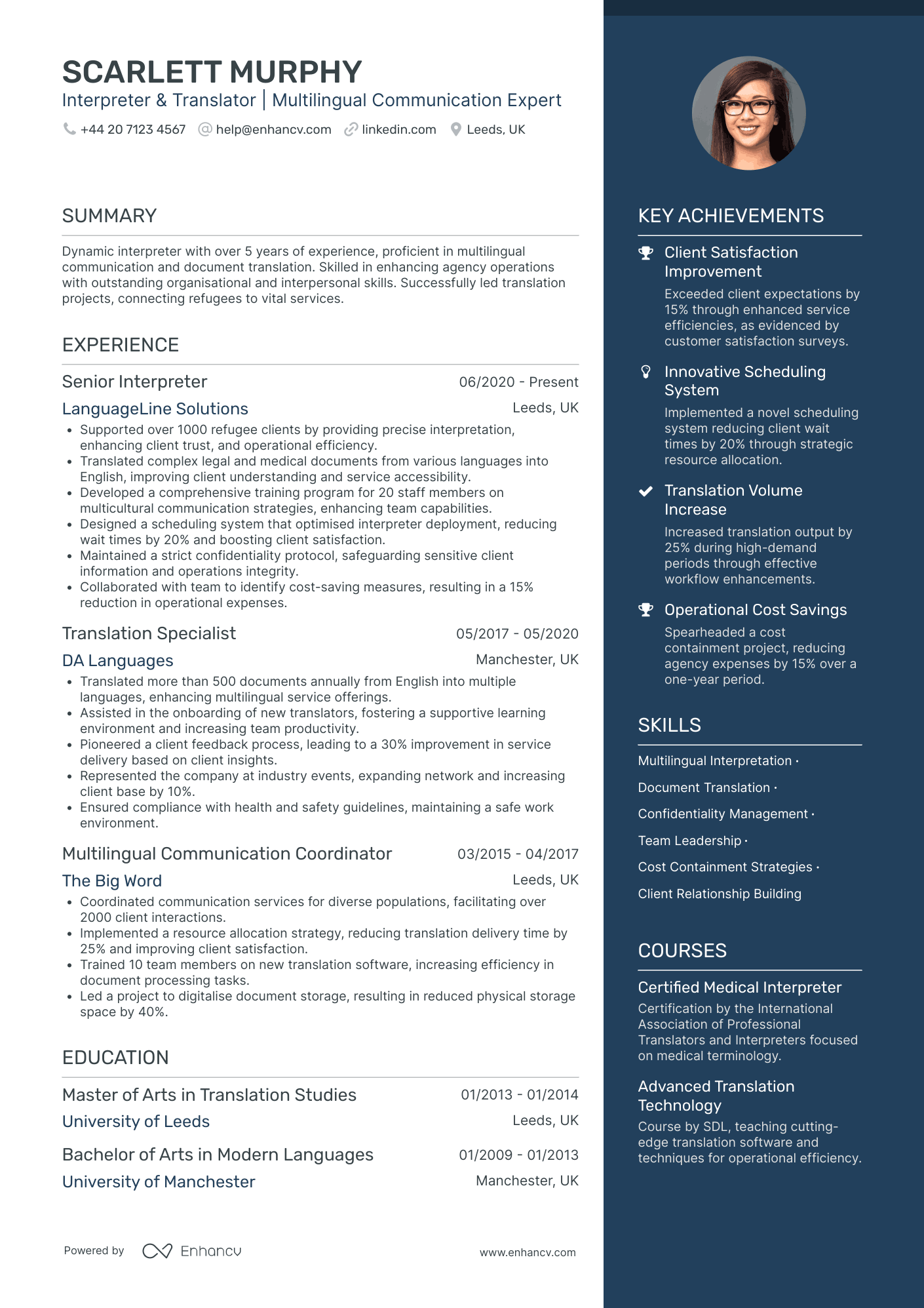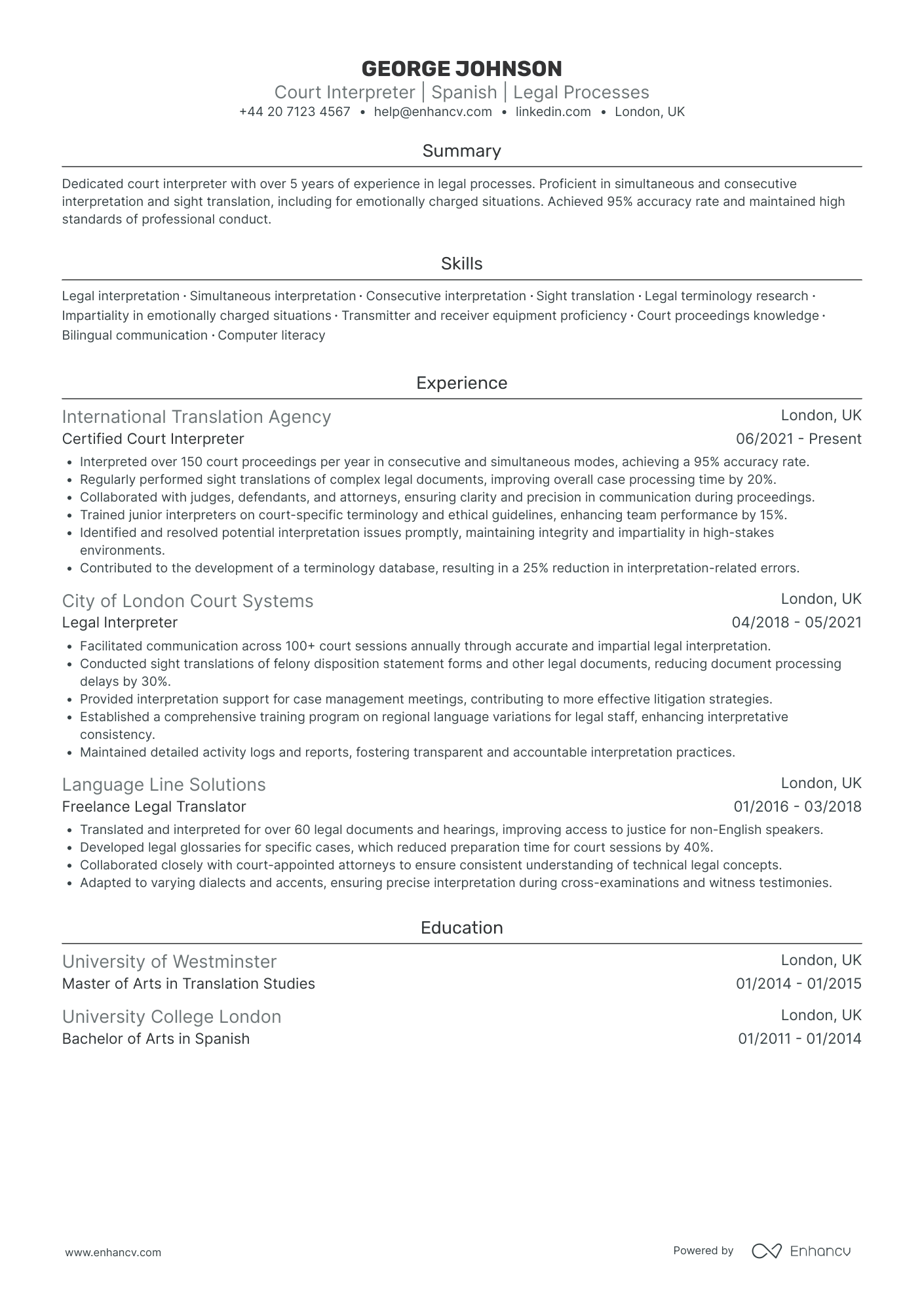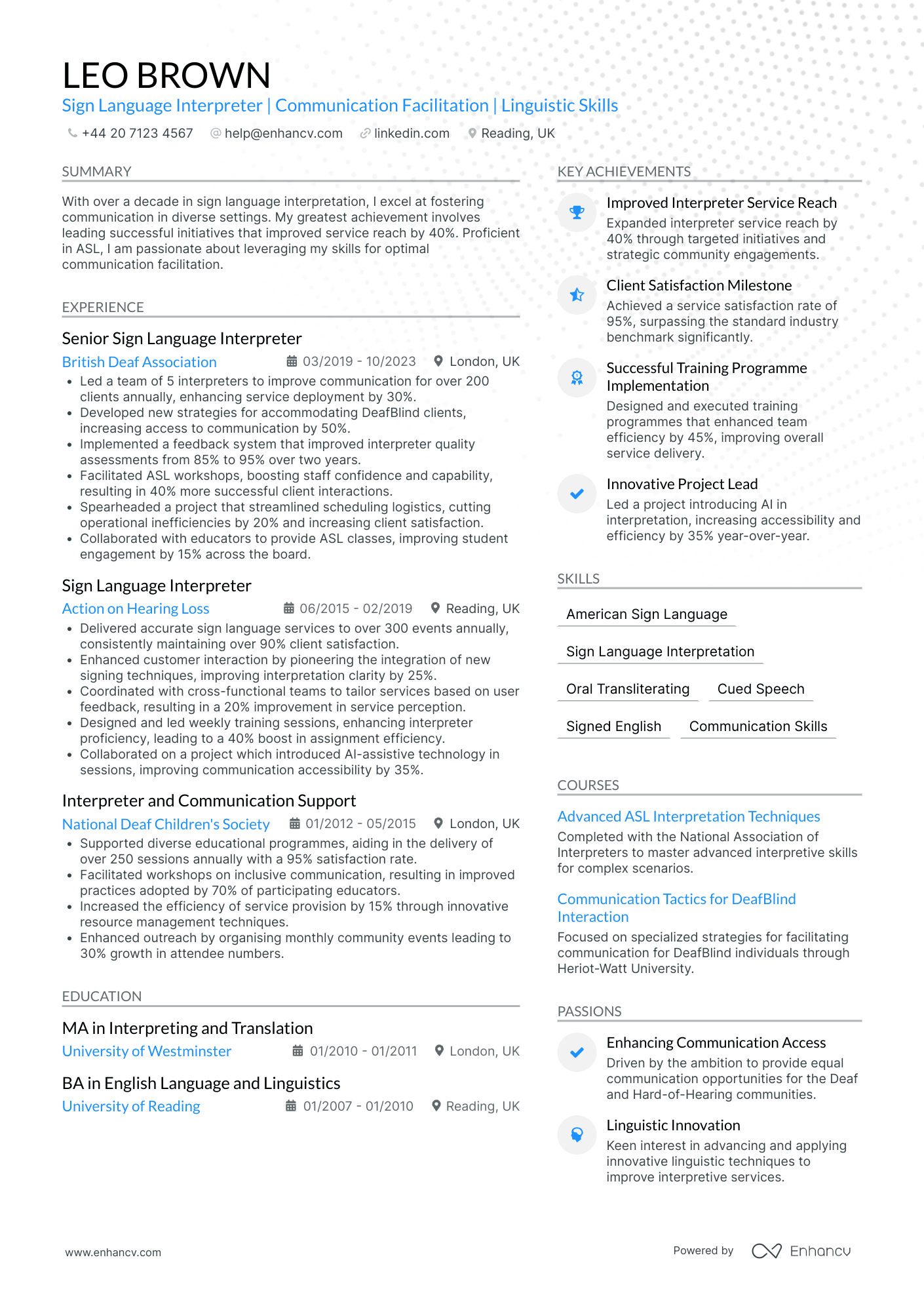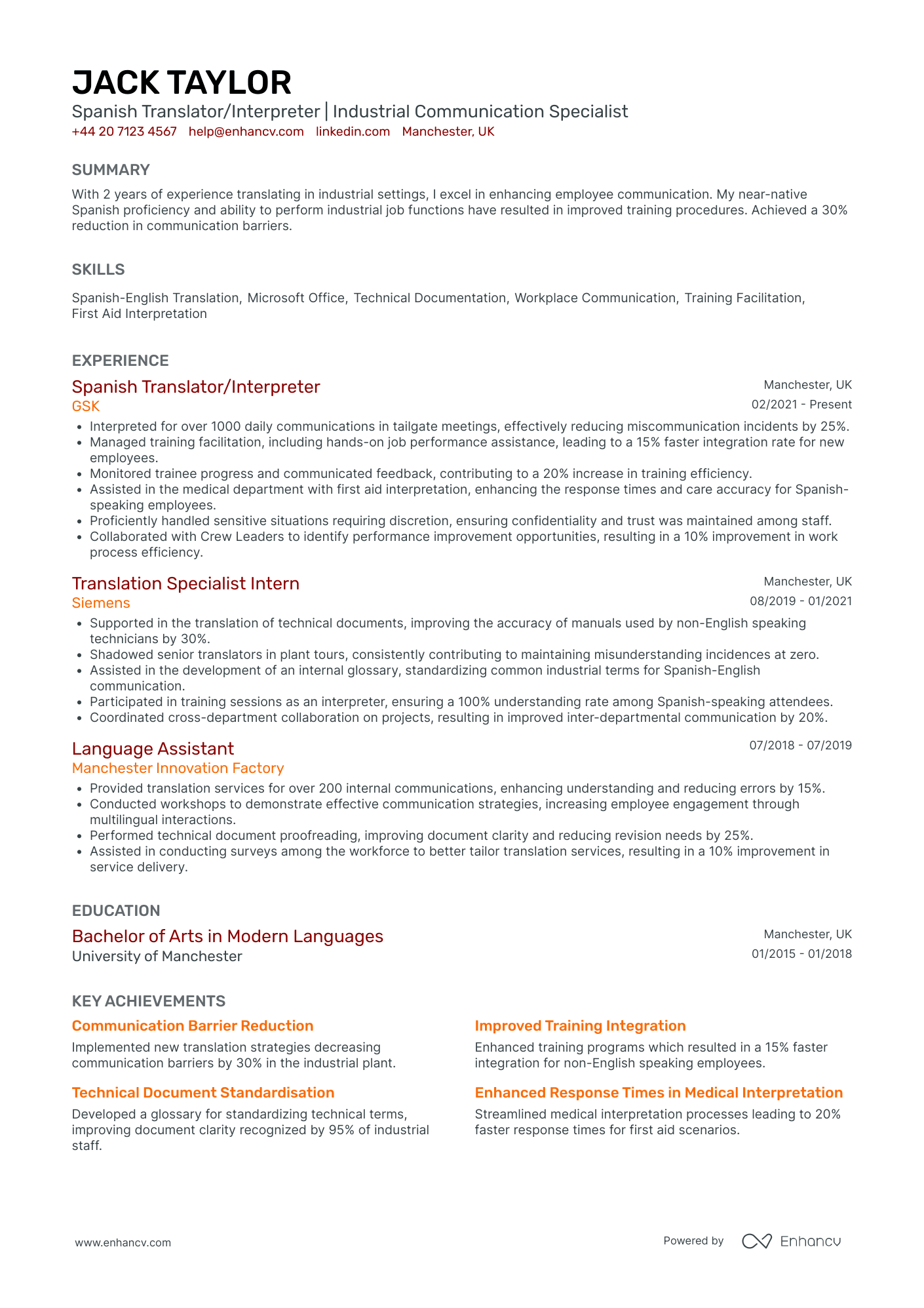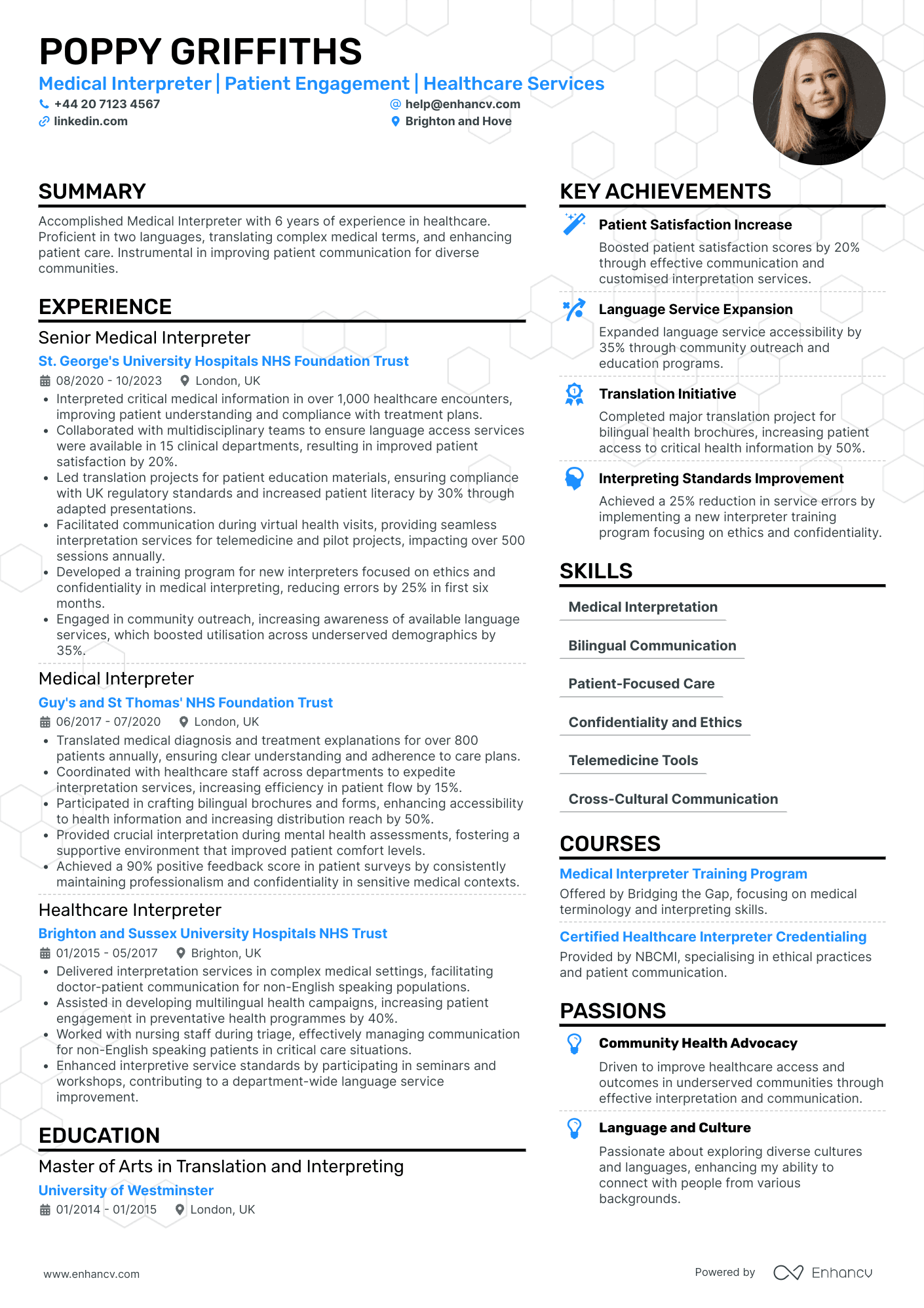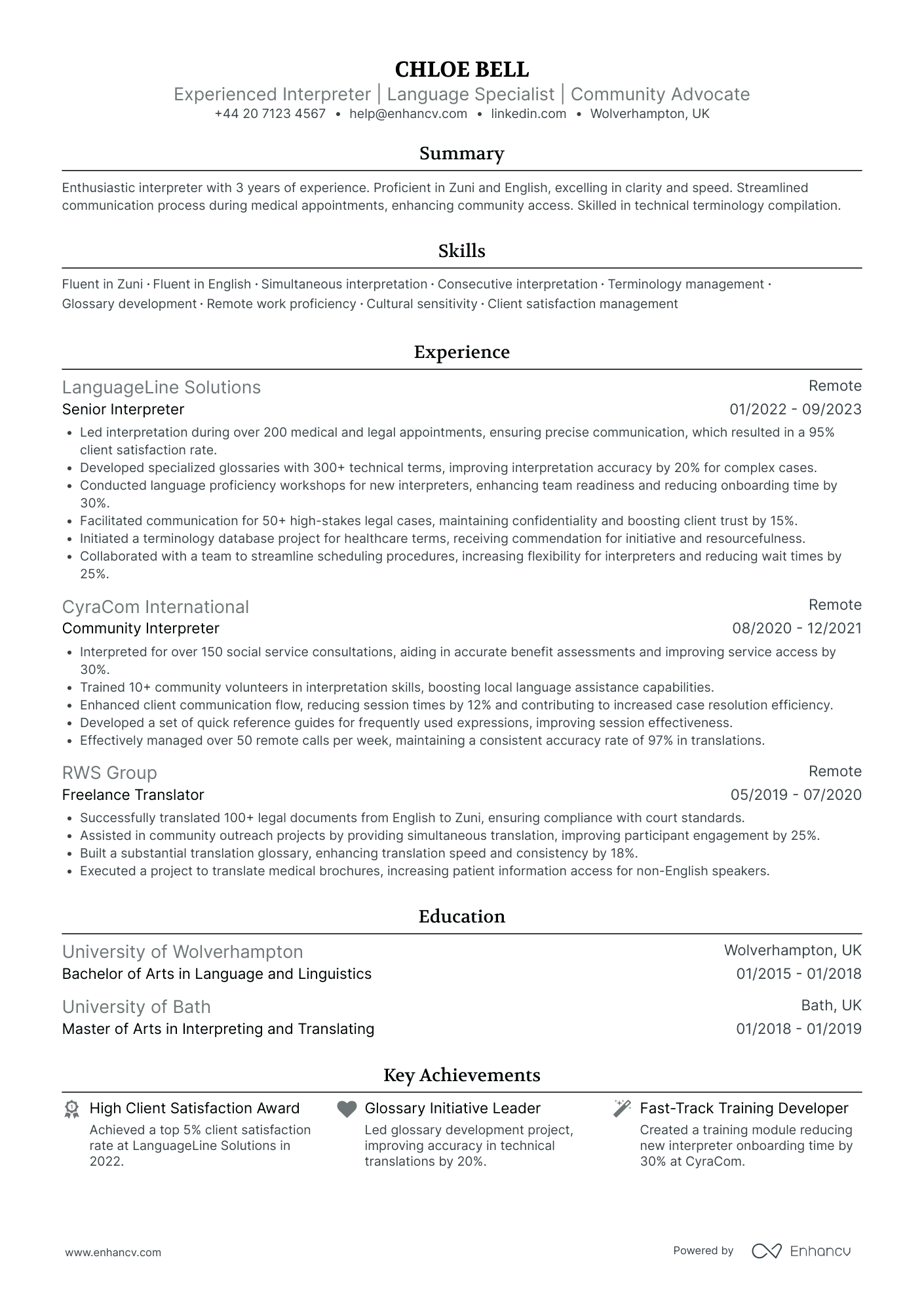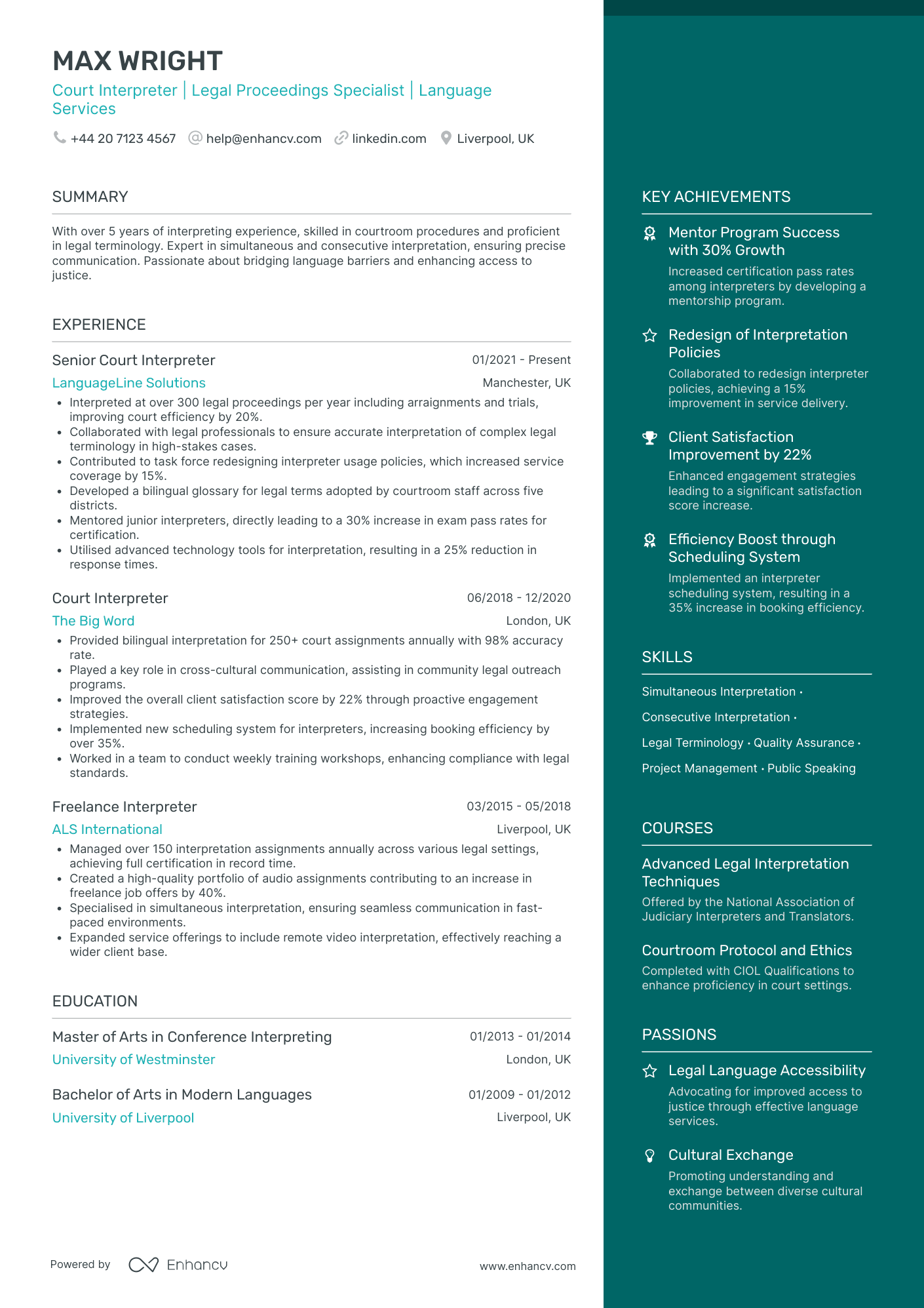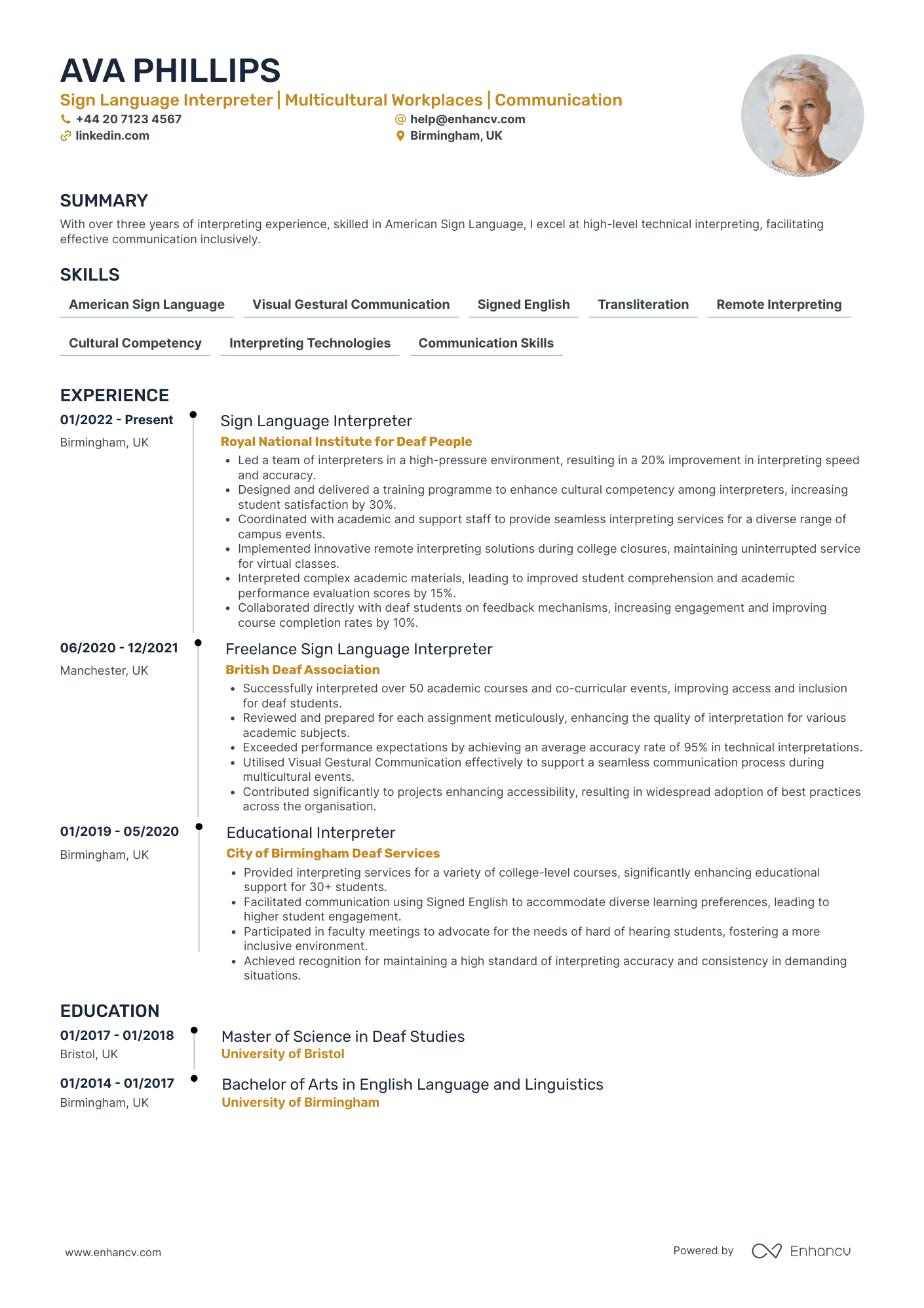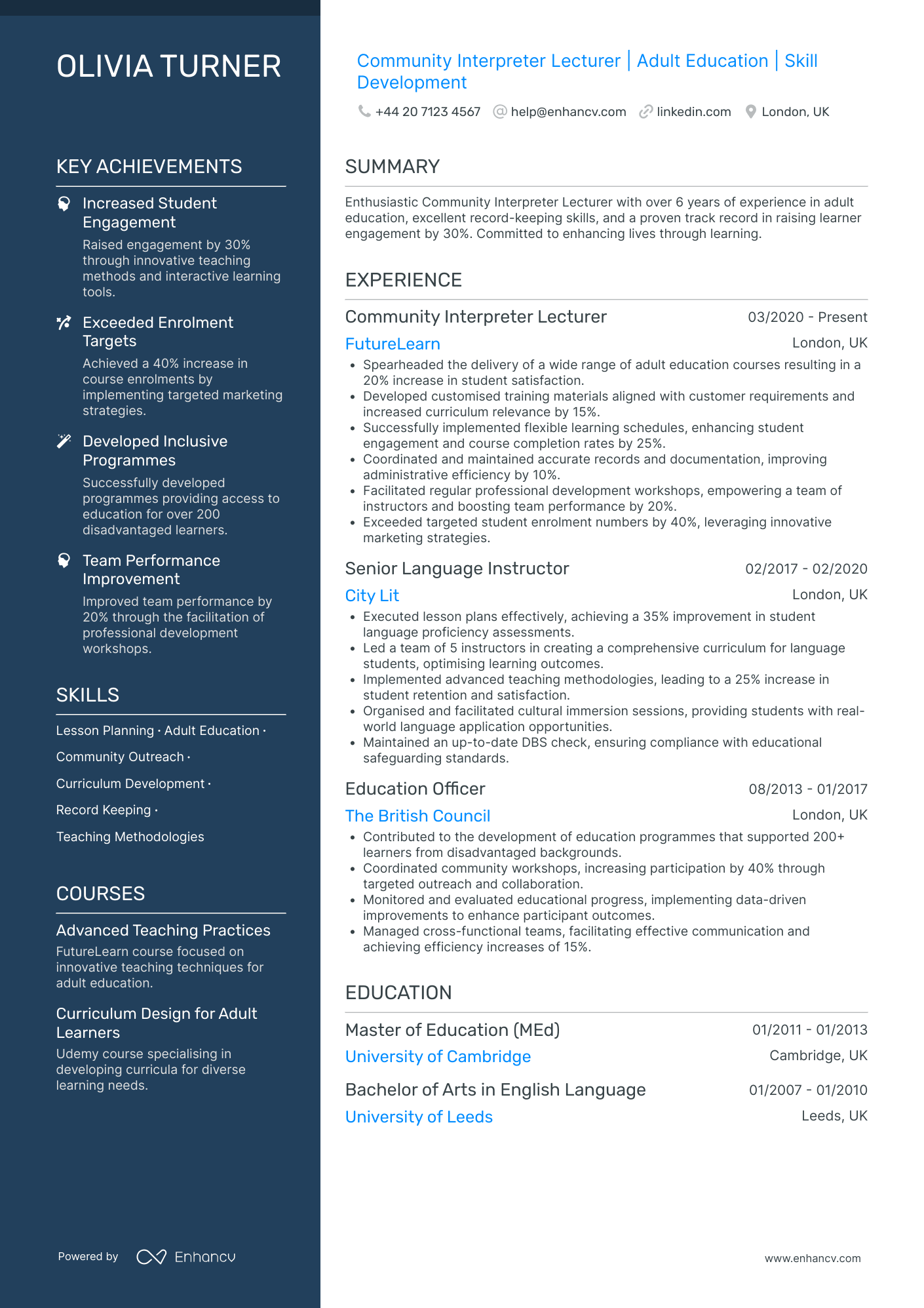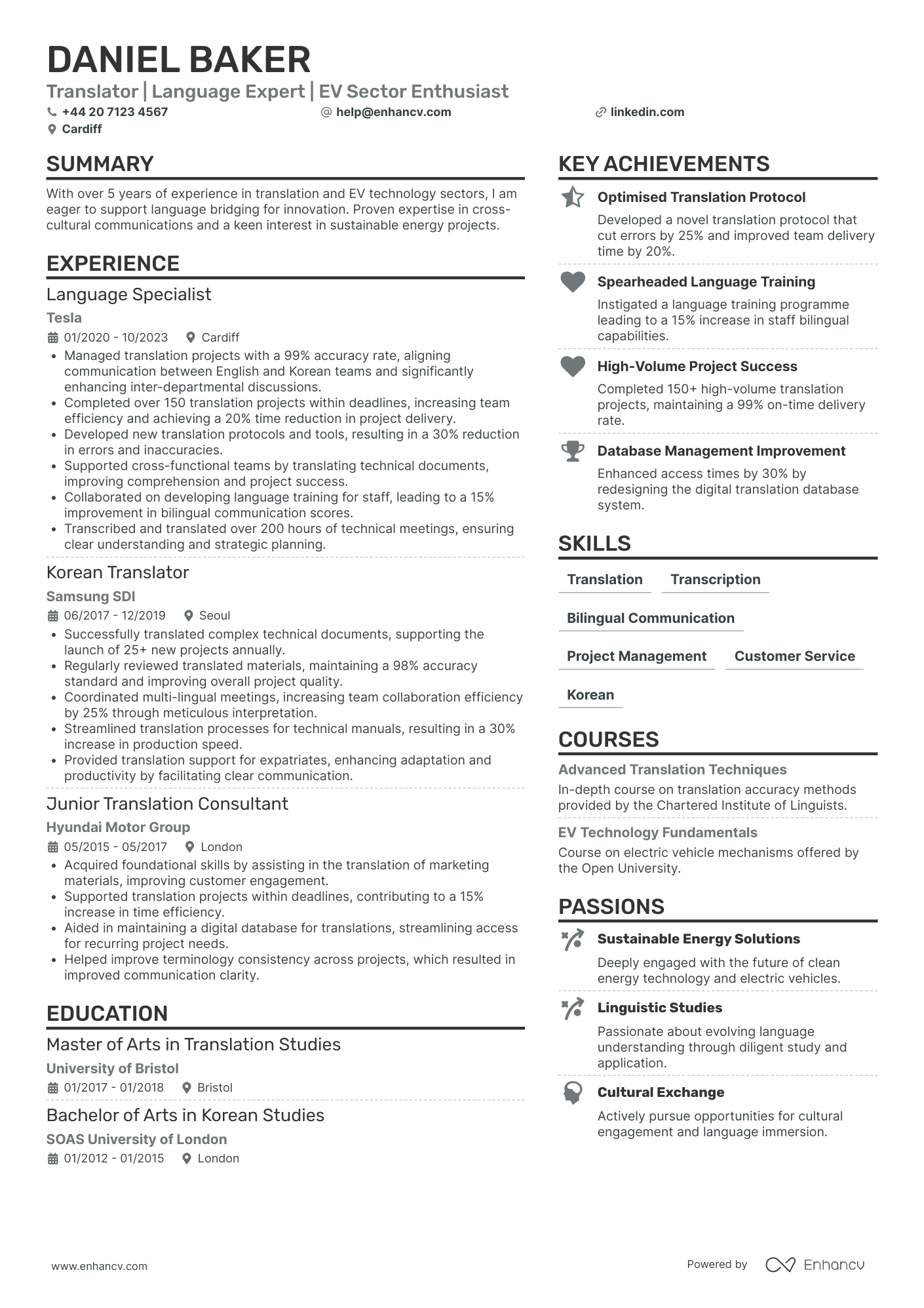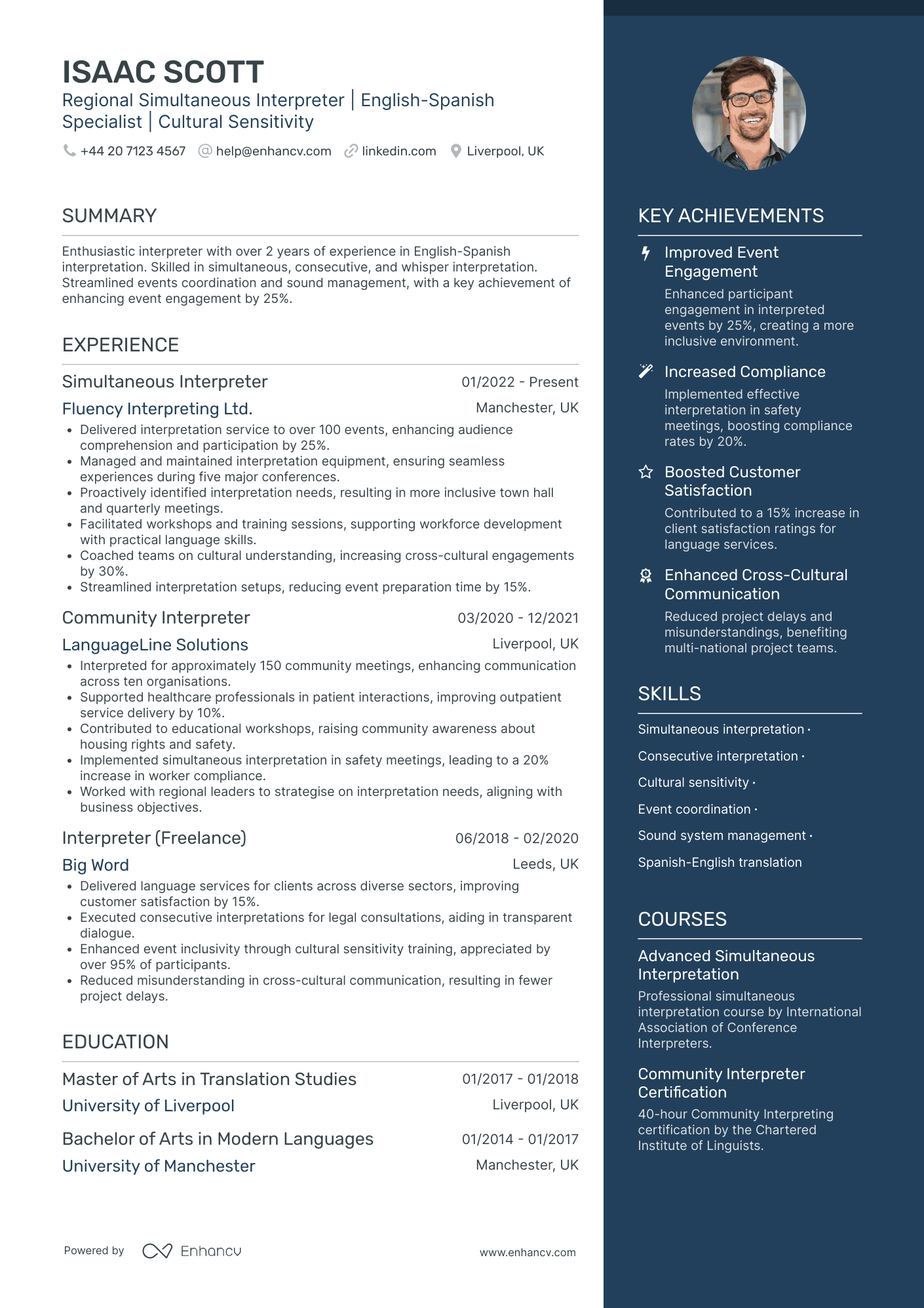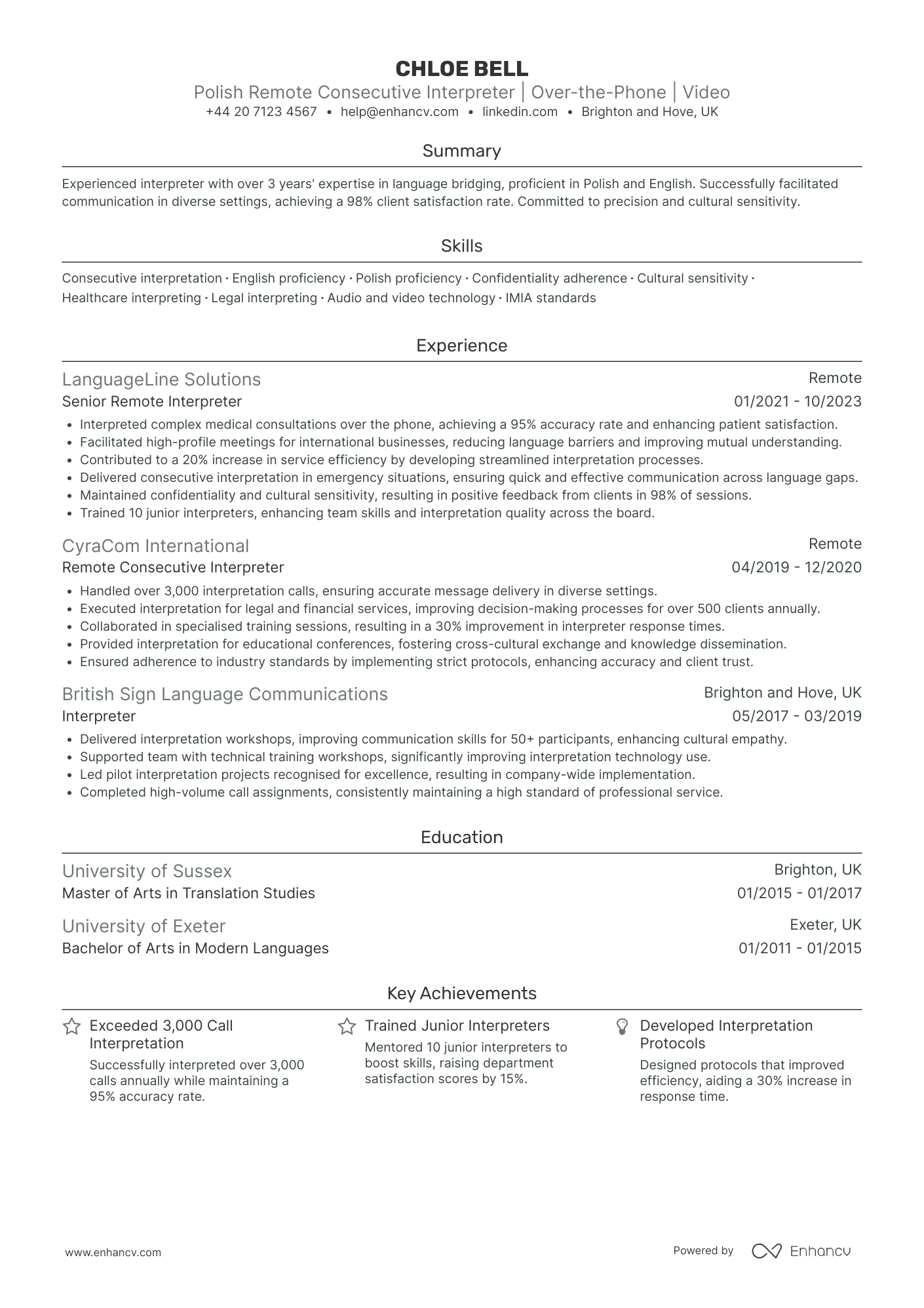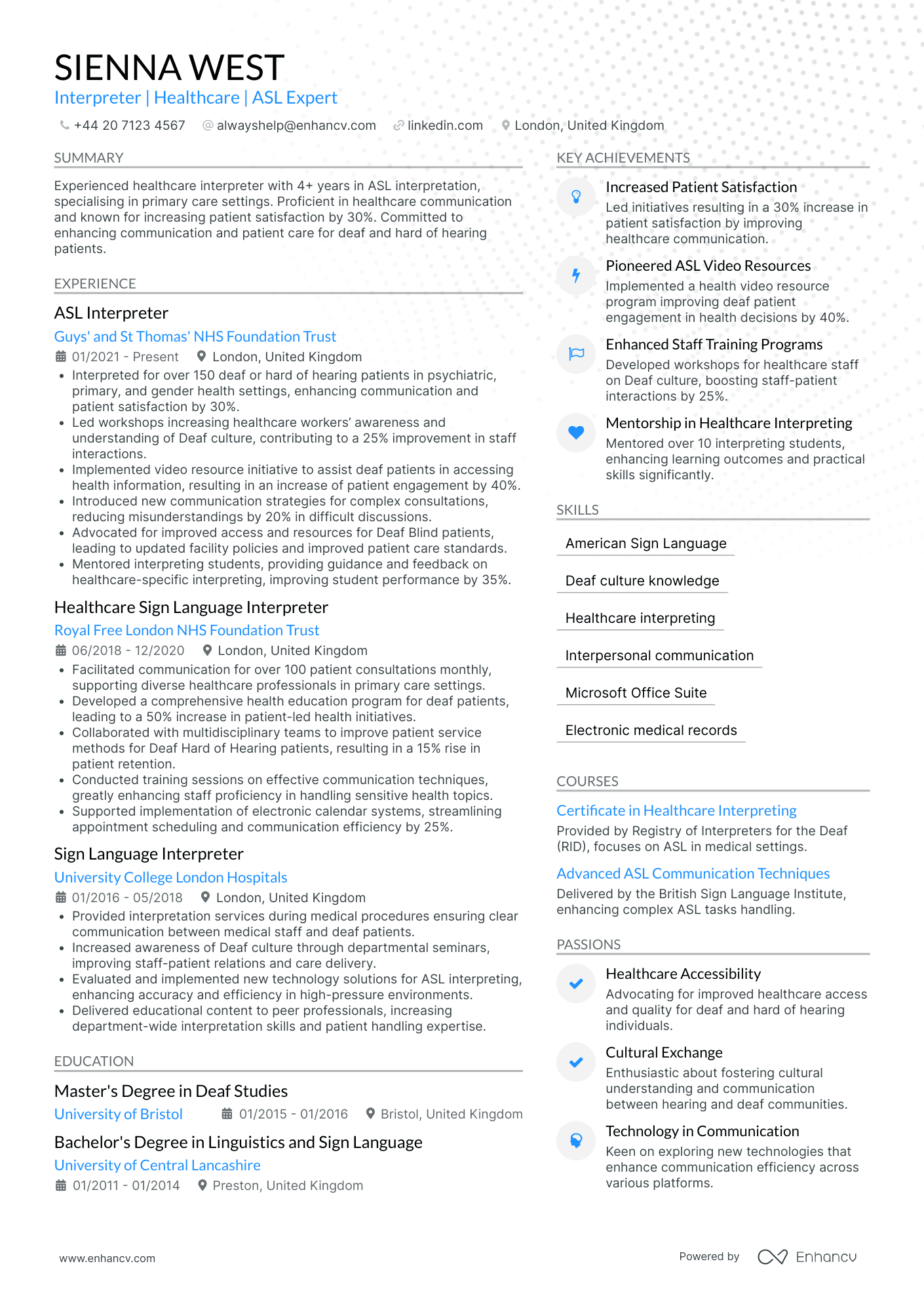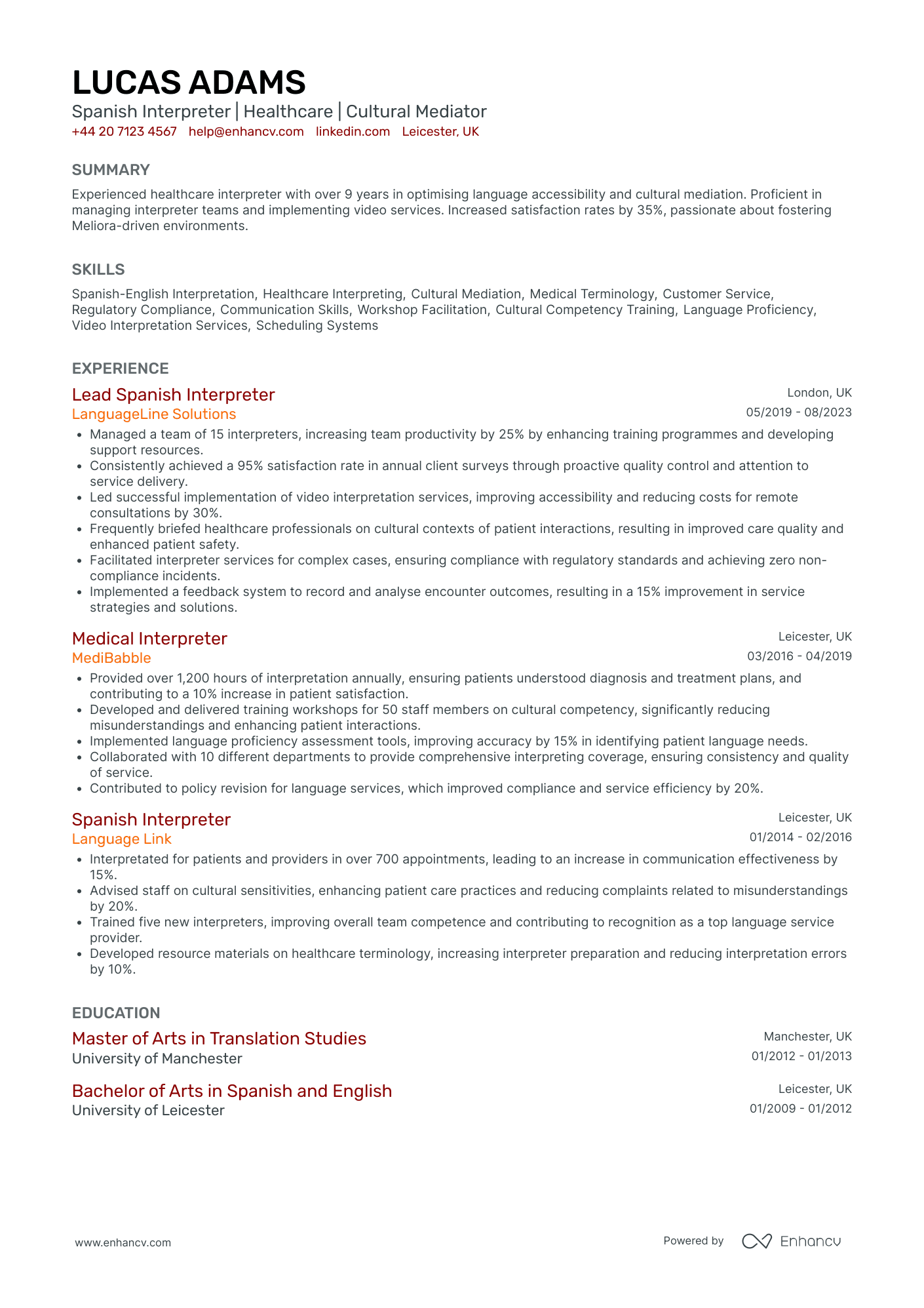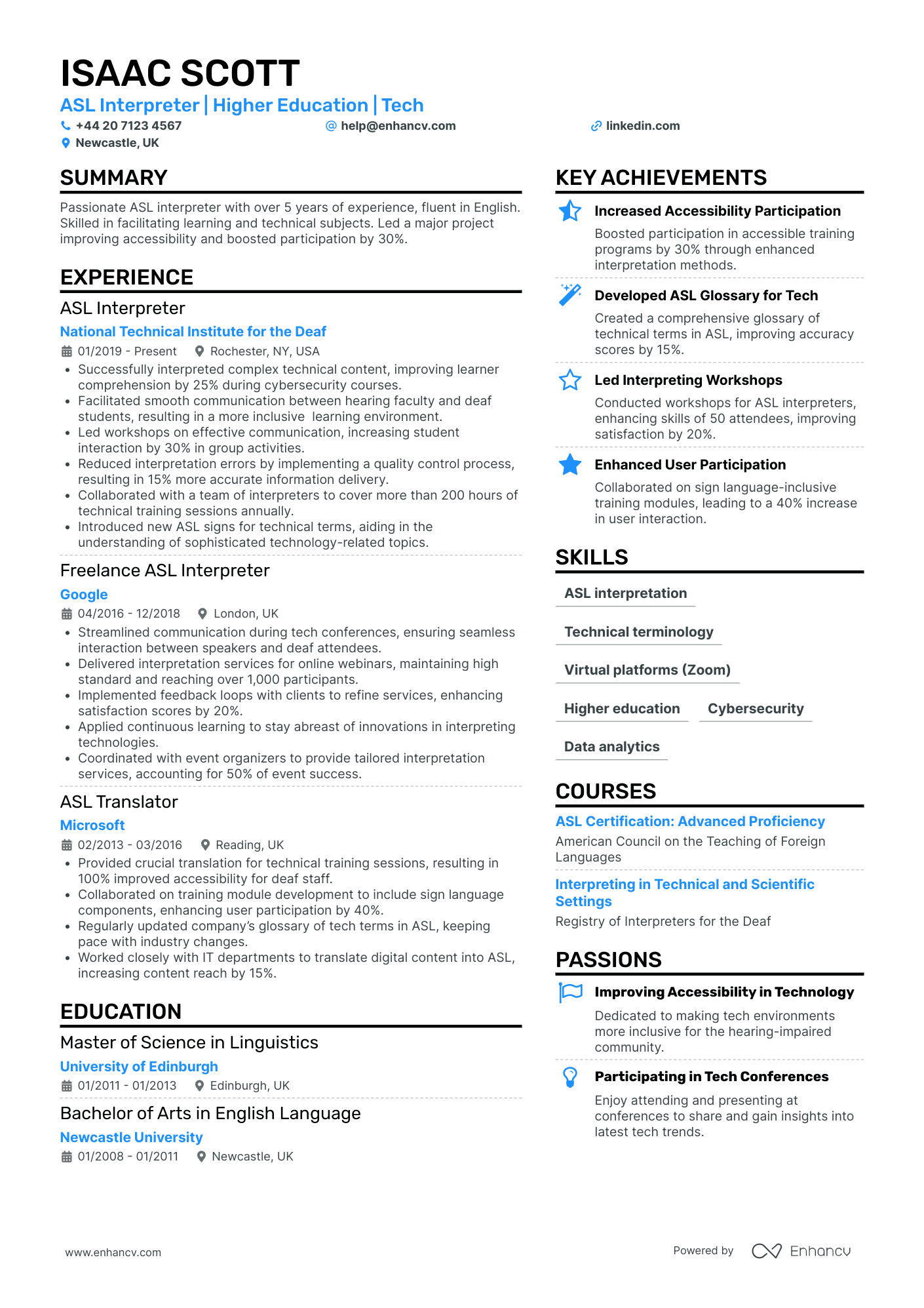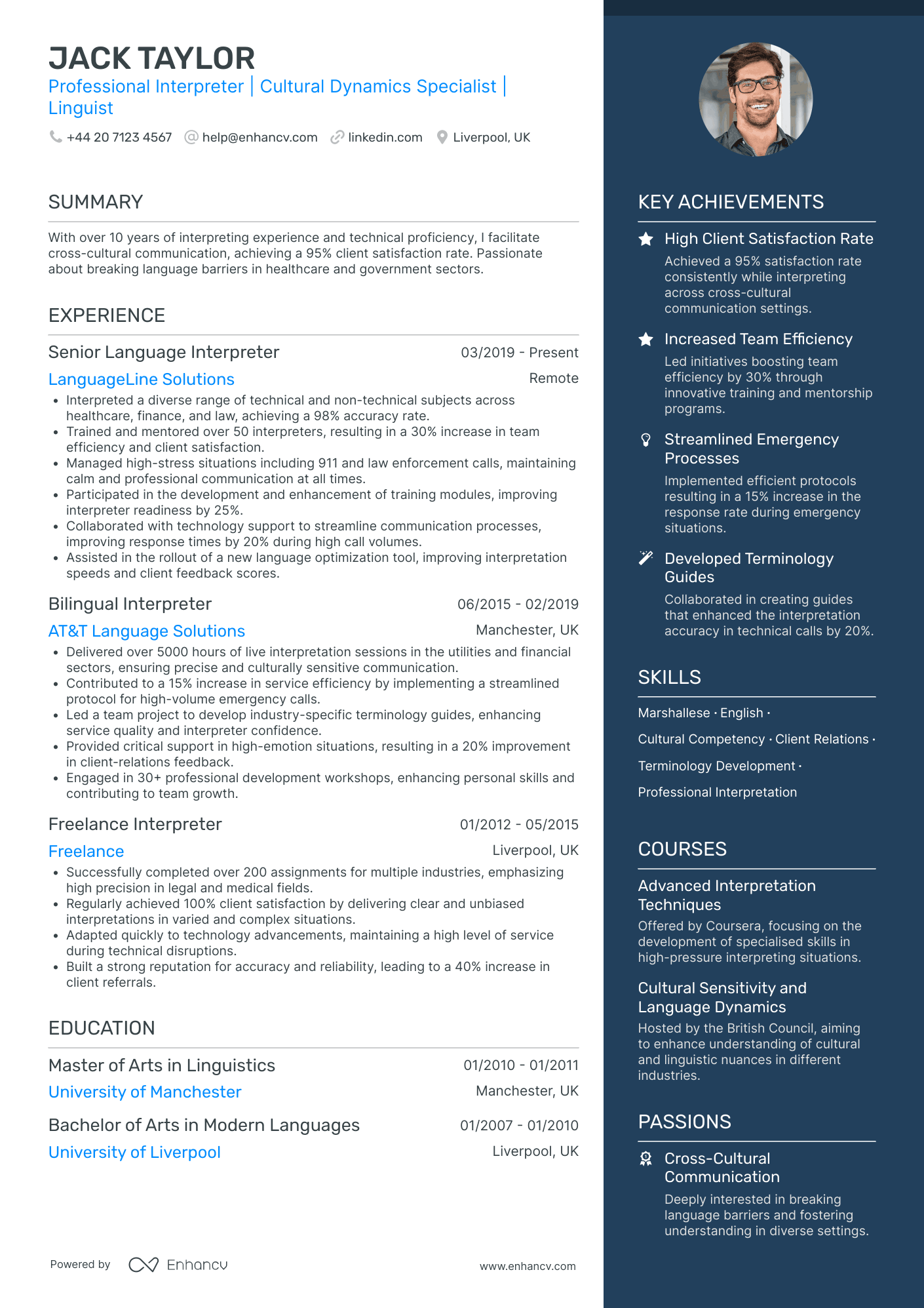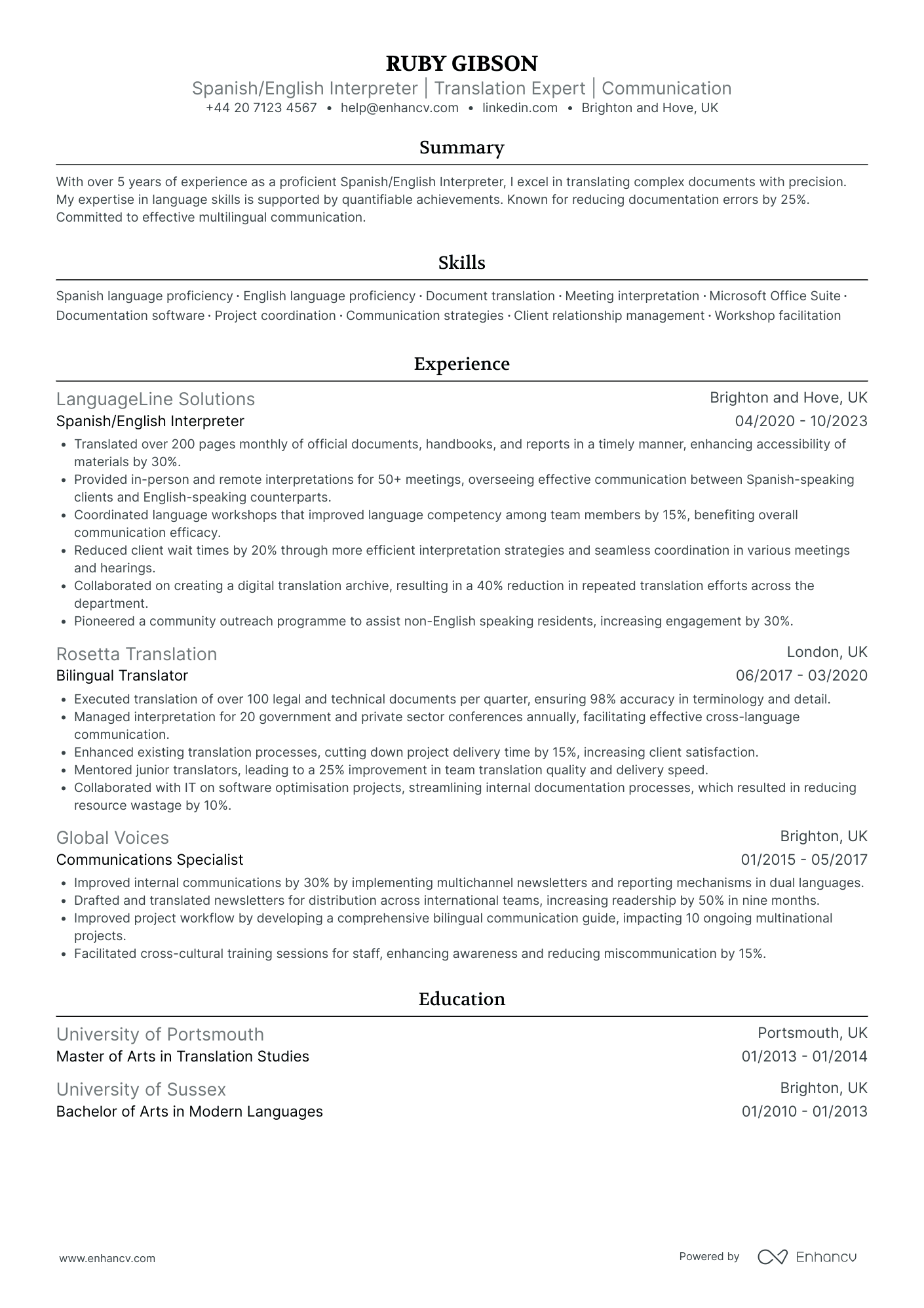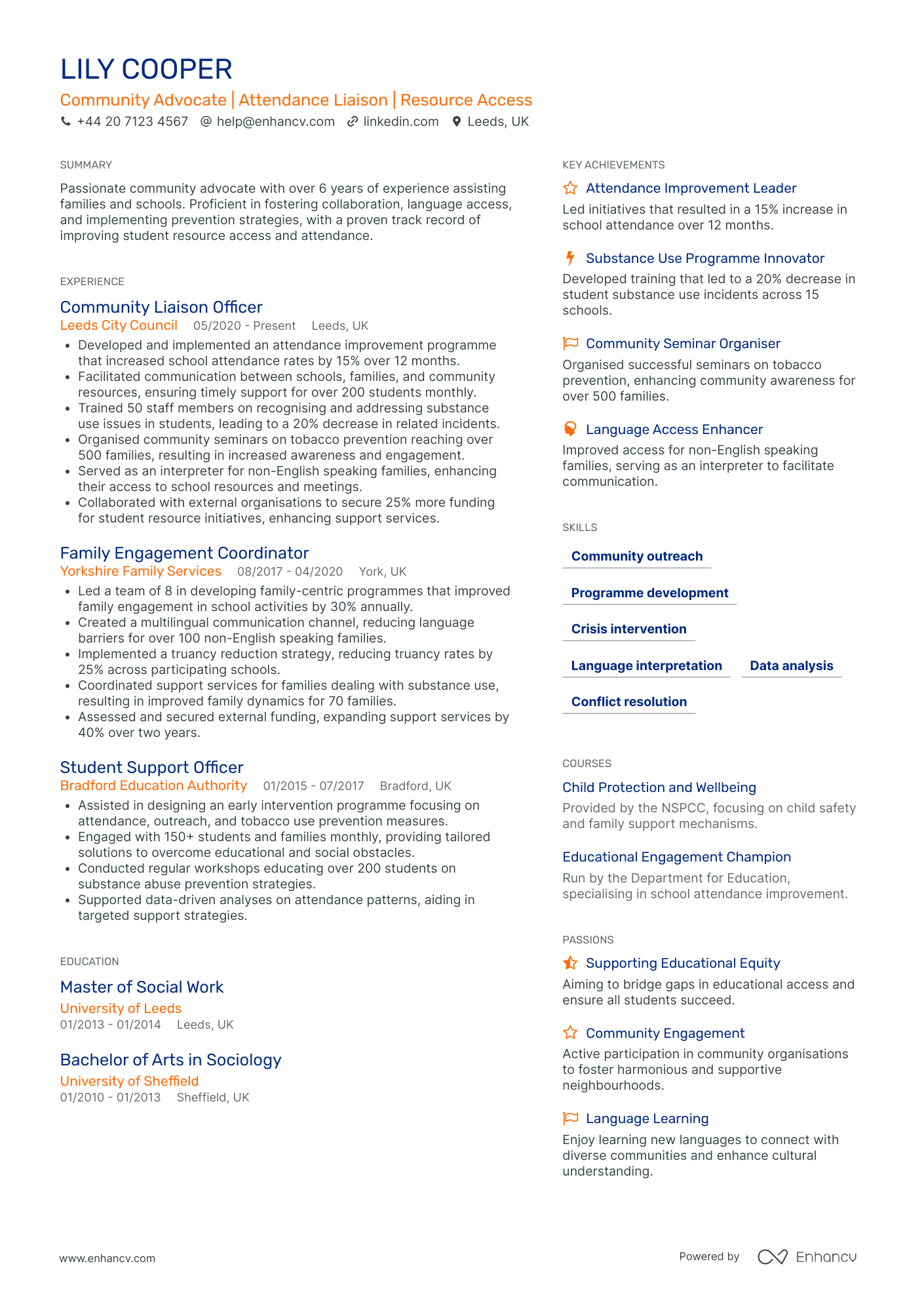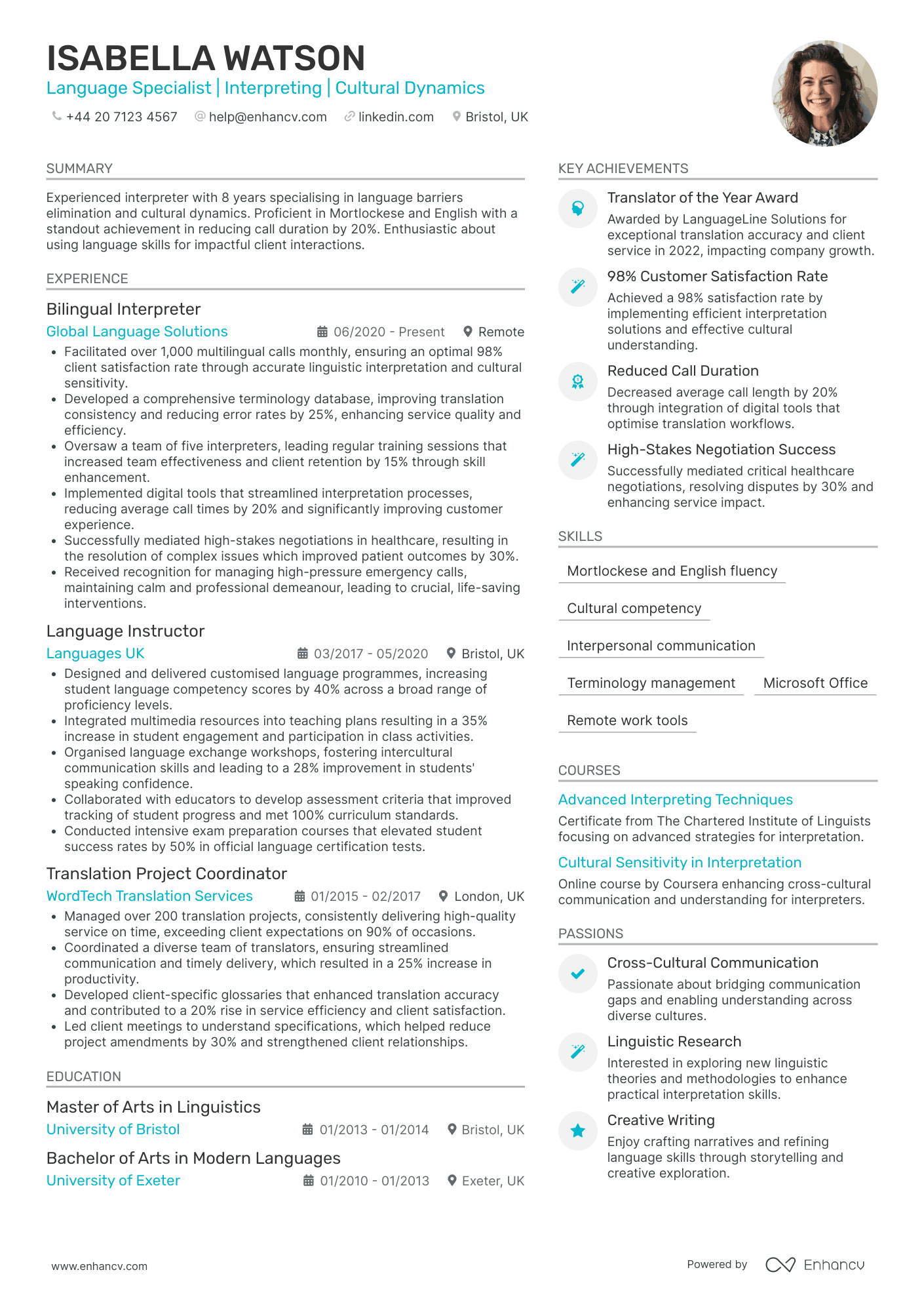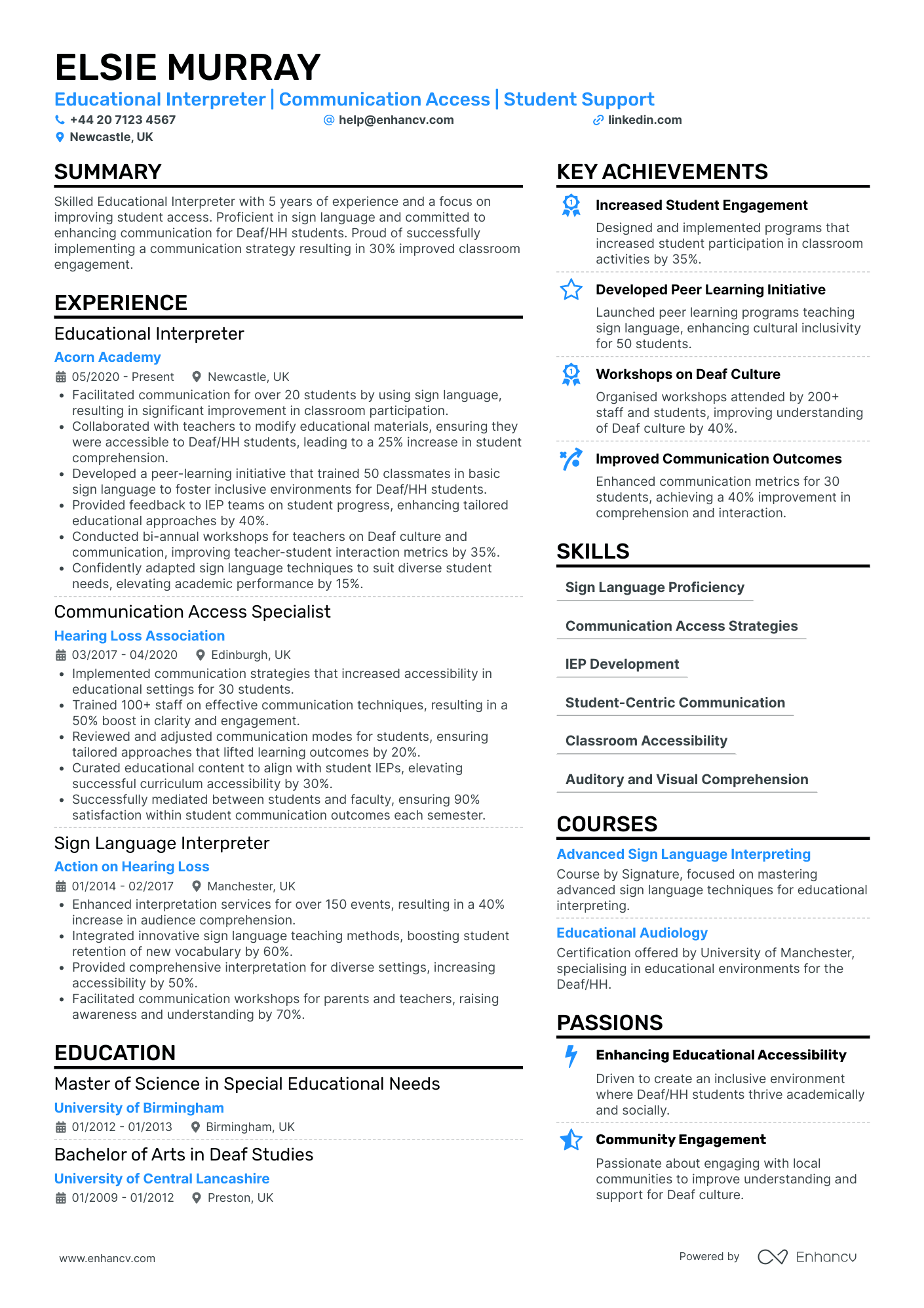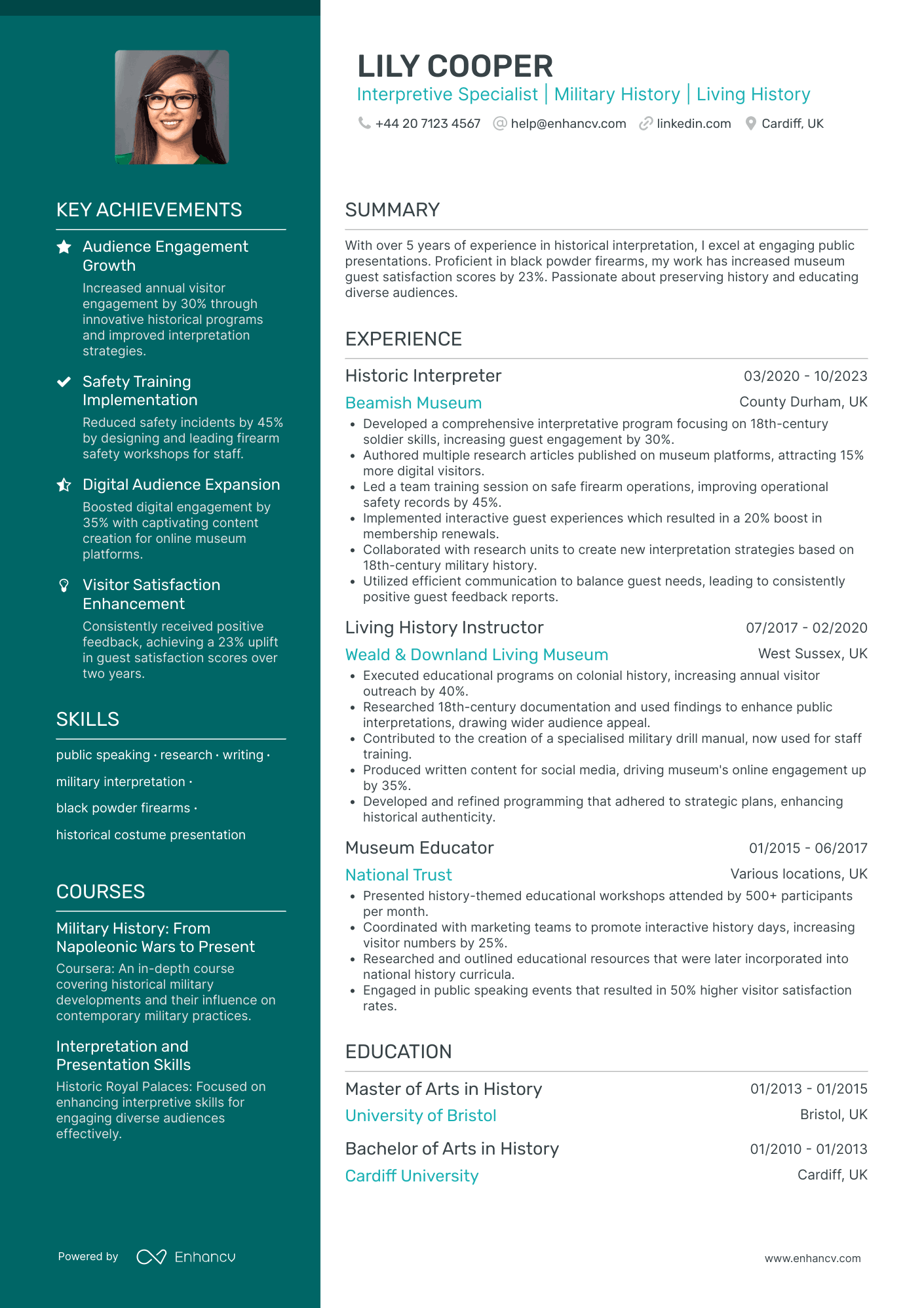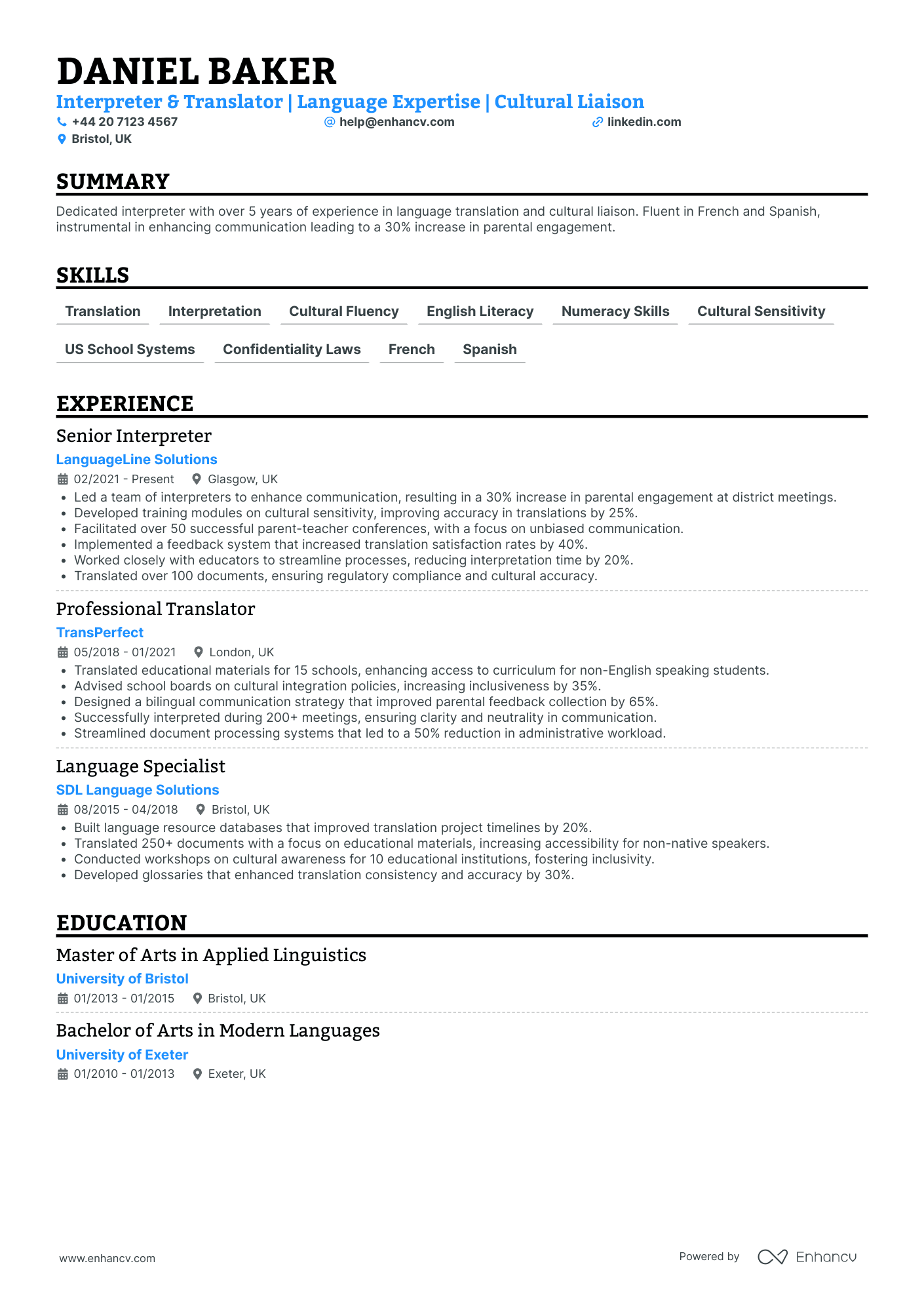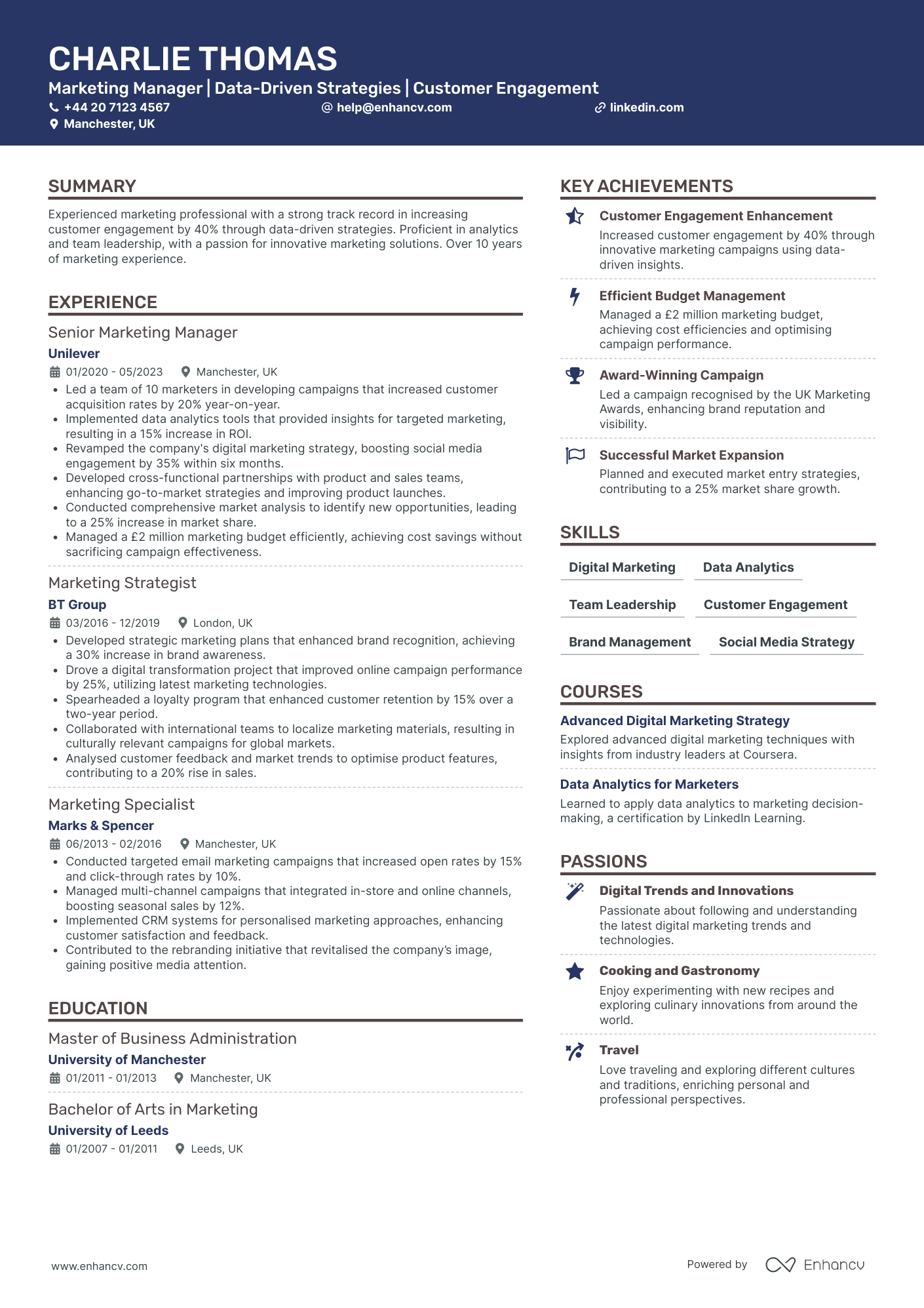One common CV challenge faced by interpreters is how to concisely yet effectively showcase their diverse language skills and cultural expertise. Our guide offers tailored strategies to help you structure your CV in a way that highlights your linguistic proficiency and interpreting accomplishments, ensuring potential employers immediately recognise your value.
- Design and format your professional interpreter CV;
- Curate your key contact information, skills, and achievements throughout your CV sections;
- Ensure your profile stays competitive by studying other industry-leading interpreter CVs;
- Create a great CV even if you happen to have less professional experience, or switching fields.
When writing your interpreter CV, you may need plenty of insights from hiring managers. We have prepared industry-leading advice in the form of our relevant CV guides.
Resume examples for interpreter
By Experience
Entry-Level Interpreter
- Clarity and Structure - The CV is well-organized with clear sections that guide the reader through the candidate’s credentials and experience. Each section is concise yet detailed, providing a chronological progression of Ruby’s professional journey, academic accomplishments, and skill set. This clarity ensures that potential employers can easily ascertain her suitability for the role of an interpreter.
- Career Trajectory and Growth - Ruby’s career trajectory demonstrates steady growth and increased responsibility, moving from an Interpreter to a Senior Interpreter and ultimately a Lead Translator. Each role builds on her previous experience, showcasing her capability to handle more complex projects, lead teams, and improve business processes, particularly noteworthy in the competitive language services industry.
- Impactful Achievements - The achievements listed in the CV are not only quantitatively impressive but also highlight the positive impact Ruby has had within her roles. Whether it’s increasing client satisfaction rates, implementing cost-reduction strategies, or developing new translation solutions, her contributions significantly enhanced organizational performance and client outcomes. These accomplishments underscore her effectiveness in delivering results that heighten client and business success.
Experienced Interpreter
- Concise and Clear Content Structure - The CV is impeccably organized with clearly defined sections that enable easy navigation through Emily's professional journey. Each section is concise, ensuring that all relevant information is communicated efficiently without overwhelming the reader.
- Progressive and Diverse Career Trajectory - Emily's career demonstrates both growth and versatility as she transitions from freelance interpreter roles to positions in well-reputed companies like TransPerfect and LanguageLine Solutions. This progression highlights her advancement in the industry and her adaptability to different work environments.
- Strong Industry-Specific Expertise - The CV underscores Emily’s command over specialized interpreting techniques, particularly in the healthcare and legal domains. Her engagement with advanced methodologies and her role in developing training materials reflect technical depth and leadership capabilities within the language interpretation industry.
Senior Interpreter
- Strategic Advancement Highlighted - Florence Knight’s CV clearly outlines her ascension from a Court Interpreter to a Senior Interpreter Liaison, demonstrating strategic growth in her career. Each position is chosen to build on her strengths in language and legal interpretation, highlighting her progression and dedication to her field.
- Legal Context Mastery - The CV showcases Knight's unique expertise in legal terminology and procedures, crucial for effective legal interpretation. Her roles require not just language fluency but also a deep understanding of legal systems which she has leveraged to streamline communication within court settings.
- Emphasis on Leadership and Efficiency - Florence has been instrumental in developing and implementing initiatives like an interpreter feedback system and boosting court efficiency, underscoring her leadership roles in enhancing service quality. Such initiatives have tangible business impacts, improving efficiency and client satisfaction which are critical in legal settings.
Chief Interpreter
- Clear Layout and Structure - The CV is structured effectively with distinct sections for experience, education, skills, and other key elements. This structured approach makes it easy for a reader to follow the candidate's career progression and achievements. Each section is concise, highlighting only the most relevant information specific to the role of a multilingual interpreter.
- Progressive Career Growth - James Lewis has shown a trajectory of growth through positions that increasingly highlight leadership and management skills. Moving from a Language Interpreter to a Senior Interpreter role, he has taken on more responsibilities, such as training volunteers and advising on language policies, reflecting his commitment to professional development in the interpretation industry.
- Industry-Specific Skillset - The CV details a unique skillset tailored to the multilingual interpretation industry, such as event preparation, language glossary development, and proficiency in gospel terminology. These skills are not only pertinent to interpreting but also suggest an ability to adapt to sector-specific demands, which adds an additional layer of expertise beyond just language proficiency.
Freelance Interpreter
- Comprehensive Structure and Clarity - The CV is well-organized, providing a clear and concise presentation of Rosie's professional history. It logically starts with a summary, followed by an organized breakdown of experiences in reverse chronological order. Each section is neatly separated, making it easily digestible for potential clients or employers.
- Demonstrates a Strong Career Progression - Rosie’s career trajectory shows significant growth and commitment to the interpreting field. Beginning as a Community Interpreter, she advanced to more responsible Remote Interpreter roles, reflecting dedication and a consistent upward momentum within the language services industry.
- Effective Use of Technology and Methodologies - Highlighting industry-specific tools and processes, Rosie’s CV mentions proficiency with translation management systems and video conferencing tools. This not only reflects technical knowledge but also adaptability to remote environments, a crucial asset in today's globalized world.
Part-Time Interpreter
- Comprehensive yet precise content structure - The CV is well-organized with clear sections for education, experience, skills, and achievements, making it easy to navigate and understand the candidate's qualifications. Each section is concise yet detailed, outlining key responsibilities and accomplishments with a focus on results-oriented descriptions.
- Significant career progression and specialization - Jack’s career trajectory showcases a clear path of growth, from a Junior Translator to a Senior Translator, highlighting increased responsibilities and achievements in the field. His journey reflects a deep specialization in translation and interpretation, with progressive roles in leading language service companies.
- Impactful achievements underscoring business relevance - The CV includes achievements that are directly tied to business outcomes, such as improving student comprehension by 20% and enhancing communication clarity at conferences. These accomplishments reflect the tangible impact of Jack's work on organizational success and his proactive approach to optimizing processes.
Full-Time Interpreter
- Progressive Career Growth - Ivy's career trajectory is marked by steady progress from a Junior Medical Interpreter to a Senior position. This advancement showcases her ability to take on increasing responsibilities and her commitment to developing her skills within the healthcare communication field.
- Specialized Skill Set in Healthcare Interpretation - The CV delineates a strong focus on healthcare-specific interpretation and translation, highlighting Ivy's proficiency in using digital translation tools and developing medical glossaries. These industry-specific elements illustrate her technical depth and understanding of complex medical terminologies, crucial for accurate communication in healthcare environments.
- Achievements with Tangible Impact - Ivy’s accomplishments are presented in a way that emphasizes real-world impact, such as increasing compliance with infection control measures and improving patient satisfaction through her contributions. These achievements reflect not only her skills and dedication but also her ability to drive improvements within the healthcare facilities she's worked in.
Contractual Interpreter
- Structured Career Growth - The CV demonstrates a clearly defined career trajectory, highlighting Scarlett's progression from a Multilingual Communication Coordinator to a Senior Interpreter. This upward movement within the industry showcases her ability to grow and take on more responsibility over time, underscoring her commitment to professional development in multilingual communication.
- Soft Skills and Leadership Integration - Scarlett's CV highlights key soft skills that are crucial for her field, such as organisational skills, client relationship building, and confidentiality management. Additionally, her leadership is evident in achievements like developing training programs and implementing innovative systems, which position her as a proactive leader capable of driving positive change.
- Impressive Quantifiable Achievements - The document is rich with quantifiable achievements that reflect business impact, such as reducing operational expenses by 15% and increasing client satisfaction through innovative scheduling. These accomplishments not only emphasize her capacity for significant contributions but also her focus on enhancing operational efficiencies and client experiences in her roles.
Permanent Interpreter
- Focused Career Trajectory - George Johnson's career path demonstrates a clear progression within the legal interpretation field, highlighting growth from a freelance translator to a certified court interpreter. His experiences show an increasing responsibility and specialization, particularly in court settings, which underscores his commitment to professional development in legal processes.
- Emphasis on Industry-Specific Tools and Techniques - The CV highlights the candidate's proficiency with industry-specific methodologies such as simultaneous and consecutive interpretation, sight translation, and the creation of a terminology database. These demonstrate a technical depth and an innovative approach to reducing interpretation-related errors and improving legal process efficiency.
- Comprehensive Achievements with Real-world Impact - Johnson's ability to maintain a high accuracy rate and streamline document processing is not only impressive numerically but also speaks to his positive impact on court efficiency. The CV effectively conveys how his contributions have led to tangible improvements in the processing times and effectiveness of legal proceedings, which are crucial for any court system.
Temporary Interpreter
- Structured and Concise Presentation - The CV is well-organized, with distinct sections for experience, education, skills, and other relevant areas. Each section is easy to read, providing a concise yet comprehensive view of the candidate's qualifications and achievements.
- Progressive Career Evolution - Leo's journey from an Interpreter and Communication Support role to a Senior Sign Language Interpreter demonstrates a clear trajectory of growth and increasing responsibility. Promotions reflect industry acknowledgment of his expertise and leadership capabilities.
- Innovative Use of Technology - The CV highlights Leo's engagement with cutting-edge tools like AI-assistive technology, showcasing industry-specific methodologies that enhance communication accessibility and efficiency for clients.
Junior Interpreter
- Effective Content Presentation – The CV is structured with a clear and concise format, making it easy to navigate. Each section is organized logically, allowing recruiters to quickly glean the candidate's qualifications, skills, and achievements. The use of bullet points under each experience entry emphasizes the applicant's specific contributions and ensures key details are highlighted without overwhelming the reader with excessive information.
- Distinct Career Progression – Jack Taylor's career trajectory reflects a focused and consistent growth path within the specialized field of industrial communication and translation. His roles show a progression from a Language Assistant to an accomplished Spanish Translator/Interpreter, indicating his increasing expertise and the value he brings to his employers. This growth aligns well with his passion for enhancing communication efficiency and indicates a clear dedication to his field.
- Substantial Industry-Specific Expertise – The CV underscores Taylor's familiarity with tools and methodologies specific to industrial communication settings. His experience with technical documentation translation, creation of standard glossaries, and first aid interpretation demonstrate a deep technical understanding that's crucial in industrial environments, setting him apart from translators lacking such niche industry exposure. These elements highlight his capability to handle specialized translation tasks effectively, thus adding significant business value.
By Role
Medical Interpreter
- Content presentation emphasizes clarity and structure - The CV is well-organized, with clearly defined sections for experience, education, skills, courses, achievements, languages, and passions. Each section presents relevant details concisely, making it easy for hiring managers to quickly assess the candidate's qualifications and experience.
- Career trajectory sheds light on growth and industry expertise - Poppy Griffiths' career exhibits a clear progression from a Healthcare Interpreter to a Senior Medical Interpreter position within reputable NHS Trusts. Her journey highlights increased responsibilities and expertise, demonstrated through leadership roles in translation projects and training programs.
- Achievements underscore tangible business impact - The CV highlights achievements with quantifiable business outcomes, such as a 20% improvement in patient satisfaction and boosting service utilization by 35%. These accomplishments not only demonstrate proficiency in medical interpretation but also emphasize the candidate’s ability to make significant contributions to healthcare services.
Conference Interpreter
- Progressive Career Development - Chloe Bell’s CV showcases a clear upward trajectory in her interpreting career. Starting as a Freelance Translator and moving up to a Senior Interpreter position at LanguageLine Solutions, it highlights her steady growth and increasing responsibilities, culminating in leading high-stakes interpretation sessions.
- Focused Industry-Specific Expertise - The CV demonstrates Chloe's specialized skills in language interpretation, particularly in medical and legal contexts. Her ability to lead glossary projects and conduct proficiency workshops emphasizes her technical depth in terminology management, crucial for precise communication.
- Significant Impact through Achievements - Chloe's accolades and achievements effectively communicate her impact beyond mere numbers. For instance, her receipt of the High Client Satisfaction Award underscores the quality of service she provided, reinforcing her ability to foster trust and improve client relations in sensitive sectors.
Legal Court Interpreter
- Logical career progression - Max Wright's career trajectory in the field of language services showcases a clear progression from a Freelance Interpreter to a Senior Court Interpreter, reflecting consistent professional growth and dedication to the specialization in legal proceedings. This demonstrates an ongoing commitment to personal and professional development in the legal interpretation field.
- Emphasis on soft skills and leadership - The CV highlights Max's mentoring capabilities and leadership in increasing certification pass rates by 30% among junior interpreters, showcasing his ability to nurture talent and improve team performance. This contributes to a culture of continuous learning and development within the organization.
- Innovative use of industry-specific technologies - By utilizing advanced technology tools for interpretation, Max has managed to significantly reduce response times by 25%, illustrating a proactive approach to integrating modern tools into traditional practices, thereby enhancing efficiency in delivering interpretation services.
Sign Language Interpreter
- Strategic Leadership and Team Development - Ava demonstrates strong leadership capabilities through her role at the Royal National Institute for Deaf People, where she successfully led a team of interpreters in high-pressure situations. Her initiative in designing training programs to improve cultural competence and collaboration with academic staff highlights her strategic approach to team development and effective communication facilitation.
- Continuous Professional Growth and Specialization - Ava’s career trajectory shows a clear path of professional growth, from an Educational Interpreter to a lead role within a national institute, exemplifying her deepening expertise in sign language interpretation. Each position marks an advancement in skills and responsibilities, reflecting her commitment to specialization in technical interpreting and cultural competency.
- Innovative Adaptation and Technological Integration - Ava's career includes significant adaptability and the implementation of remote interpreting solutions, especially during college closures. Her use of visual gestural communication and interpreting technologies demonstrates a forward-thinking approach to accessibility and communication in multicultural environments, setting industry-specific benchmarks for seamless service delivery.
Community Interpreter
- Clarity and Structured Presentation - The CV exhibits exceptional clarity with its well-organized sections like education, work experience, skills, and passions. Each section contributes directly to the candidate's narrative as an expert in adult education and community interpreting, which aids in quick comprehension of their qualifications and achievements.
- Career Trajectory and Growth - Olivia Turner's career path shows notable progression from an Education Officer to a Community Interpreter Lecturer, reflecting a growth in responsibilities and leadership. The transition between roles demonstrates her ability to adapt and thrive in diverse educational environments, showing upward mobility in her career.
- Impactful Achievements in Education - The CV highlights significant achievements with quantifiable results, such as a 40% increase in enrolment and a 30% boost in learner engagement. These accomplishments are not just numbers but also indicate her capacity to improve educational outcomes and meet institutional goals effectively.
Business Interpreter
- Structured presentation and clarity - Daniel Baker's CV is well-structured, making it easy to follow through his career path. Each section is clearly defined, allowing an employer to understand his professional journey quickly. The content is concise and direct, focusing on relevant details that efficiently communicate his qualifications and experience in both the translation and EV sectors.
- Dynamic career progression in industry-leading companies - Daniel’s career trajectory demonstrates a significant growth within high-profile organizations such as Tesla and Samsung SDI. Starting from a Junior Translation Consultant, he progresses to more specialized roles like Language Specialist, reflecting his growth in expertise and responsibility. This advancement illustrates his adaptability and capability to thrive in fast-paced, innovative environments.
- Integration of industry-specific tools and innovative methodologies - The CV highlights Daniel's proficiency in developing new translation protocols and tools, showcasing his technical acumen and innovation in optimizing translation processes. His role in reducing errors and enhancing communication through these protocols exhibits his strategic thinking and impact on operational efficiency within the language and technology sectors.
Simultaneous Interpreter
- Clear career progression and specialization - Isaac's CV highlights a linear career trajectory with increasing responsibility in the field of interpretation, moving from a community interpreter to a simultaneous interpreter. Each step reflects deepening expertise and a focus on specialized skills in English-Spanish interpretation, showcasing a clear path of career growth and specialization.
- Strong emphasis on unique industry skills and methodologies - The CV underscores specific skills related to the interpretation industry, such as simultaneous and consecutive interpretation, cultural sensitivity, and sound system management. These industry-specific elements signal a high level of technical depth and proficiency in the tools and methodologies critical for effective interpretation.
- Impactful achievements with business relevance - Isaac's experience section emphasizes achievements with significant business impacts, such as enhancing event engagement by 25% and increasing compliance rates in safety meetings by 20%. These accomplishments demonstrate not only his capability but also how his work directly contributes to organizational success and stakeholder satisfaction.
Consecutive Interpreter
- Concise and Well-Structured Presentation - The CV is neatly organized with clearly labeled sections that allow for easy navigation and understanding of the candidate's qualifications. Each experience entry is succinct, highlighting key responsibilities and achievements with bullet points, contributing to a clear and focused presentation of skills and expertise.
- Progressive Career Development - Chloe Bell's career shows a clear trajectory, moving from an Interpreter role to Senior Remote Interpreter over a few years. This progression underscores her professional growth and her increased responsibilities, illustrating her aptitude for taking on more challenging and higher-stakes tasks in the interpreting field.
- Emphasis on Technical Skills in Interpretation - The CV highlights industry-specific competencies, such as audio and video technology skills and adherence to IMIA standards, showcasing Chloe’s technical proficiency and adaptability to remote and technologically-reliant interpreting methods. This depth of technical skills is essential in remote interpretation, where communication relies heavily on technology.
Technical Interpreter
- Clear and organized presentation - The CV is thoughtfully structured, presenting information in a concise and logical manner. Each section is clearly delineated, making it easy for the reader to navigate through the candidate's experience and skills without feeling overwhelmed by excessive detail.
- Career growth within the healthcare interpretation field - The candidate’s career trajectory shows a clear progression within healthcare institutions, starting from University College London Hospitals and moving to prominent roles at Guys' and St Thomas' and Royal Free London NHS Foundation Trusts. This reflects a dedication to expanding their expertise and impact within the healthcare ASL interpretation sector.
- Unique focus on healthcare-specific ASL initiatives - The candidate employs innovative strategies tailored to the healthcare industry, such as developing video resources for deaf patients and creating workshops to educate healthcare staff on Deaf culture. These initiatives not only highlight their technical depth in ASL interpretation but also their commitment to integrating these skills to improve patient care.
Diplomatic Interpreter
- Effective Presentation and Structure - The CV is well-organized with clearly delineated sections, allowing easy navigation through Lucas Adams' professional history. Each section is concise yet comprehensive, ensuring that key information, such as achievements and experience, is accessible and clearly highlighted.
- Sustained Career Growth in Healthcare Interpretation - Lucas Adams' career trajectory reveals a steady progression from a Spanish Interpreter to a Lead Spanish Interpreter, reflecting growth in responsibility and scope. His career path demonstrates a deepening expertise in healthcare interpretation, complemented by increasing leadership roles.
- Innovative Use of Industry-Specific Tools - The CV highlights the implementation of advanced scheduling and feedback systems tailored for healthcare settings. Such methodologies not only exhibit technical depth but also emphasize Adams' ability to enhance operational efficiency and service quality through bespoke solutions.
Telephonic Interpreter
- Exceptional Career Growth and Leadership - Isaac's career trajectory reveals a pattern of professional growth and increasingly significant roles within the field of ASL interpretation and technology. From starting as a translator at Microsoft to his current position at the National Technical Institute for the Deaf, he has showcased leadership by leading workshops, introducing new ASL signs, and improving educational access. This progression underscores his ability to adapt and take on larger responsibilities.
- Specialization in Technical Interpretation - Isaac's unique skill set includes ASL interpretation specifically tailored for technical and scientific settings, as demonstrated by his work at major tech companies like Google and Microsoft. This specialization is further supported by advanced certifications and ongoing learning, reflecting his commitment to staying at the forefront of interpreting technology, thus providing a crucial bridge in high-tech environments.
- Clear Focus on Accessibility and Impact - The CV highlights Isaac's dedication to enhancing accessibility in tech environments, a passion evident in his achievements, such as increasing accessibility participation and developing an ASL glossary for technical terms. These contributions not only show technical expertise but also underline a broader commitment to making systemic improvements that have a significant impact on organizations and their inclusivity goals.
Video Relay Interpreter
- Effective Content Presentation - The CV is well-organized, with clearly defined sections that make it easy to navigate and understand. Each section is concise, presenting key information effectively. The layout facilitates quick access to important details like contact information, skills, and experiences, which are all integral to the role of an interpreter.
- Progressive Career Trajectory - Jack Taylor's work history shows a clear path of advancement, from a Freelance Interpreter to a Senior Language Interpreter. This trajectory indicates a steady growth in responsibility and expertise within the interpretation field, demonstrating his capability to adapt to high-pressure roles and influence team dynamics positively.
- Industry-Specific Expertise - The CV highlights Jack's use of advanced interpretation tools and methodologies. His involvement in developing terminology guides and using language optimization tools demonstrates a deep understanding of the technical aspects of interpretation, crucial for accurate and efficient communication in specialized sectors like healthcare and law.
Literary Interpreter
- Structured Presentation and Clarity - This CV is organized in a logical manner, with sections clearly delineated by job role, education, skills, and additional certifications. Each section is detailed yet concise, allowing for effective communication of key information without overwhelming the reader.
- Consistent Career Growth - Ruby Gibson's career trajectory demonstrates consistent growth from a Communications Specialist to a Spanish/English Interpreter and Translation Expert. This progression exemplifies not only a deepening expertise in language services but also growth in roles demanding higher responsibility and impact.
- Technical and Methodological Prowess - The inclusion of tools and methodologies used in enhancing translation efficiencies and community engagement showcases a solid understanding of technological integration, such as digital archives and bilingual documentation systems, pivotal in today's translation industry.
Liaison Interpreter
- Strong Emphasis on Community Engagement and Advocacy - The CV highlights a commitment to community support, showcasing an extensive background in community advocacy, resource access, and school-family collaboration. This focus is evident in roles like Community Liaison Officer, where the applicant facilitated better school attendance and resource access for students and families.
- Impressive Career Progression and Stability - The career trajectory is marked by a steady progression within community-focused roles, starting from Student Support Officer to advanced positions like Community Liaison Officer. This growth not only underscores a deepening of expertise but also indicates a strong commitment to the educational and community development sectors.
- Impactful Achievements with Tangible Outcomes - The applicant’s achievements section features notable accomplishments with quantifiable impacts, such as increasing school attendance by 15% and reducing student substance incidents by 20%. These demonstrate the candidate's ability to deliver meaningful change and effective program implementation in educational settings.
Financial Interpreter
- Effective Content Presentation - Isabella Watson's CV is structured with clarity and conciseness, which brilliantly presents her qualifications and experiences. Each section is well-organized, presenting relevant details such as her roles, responsibilities, and achievements in a clear format. The inclusion of specific dates and locations adds to the CV’s clarity and helps potential employers quickly assess her career progression.
- Dynamic Career Trajectory - Isabella's career exhibits a consistent upward trajectory in the language specialist field, highlighting her growth from a Language Instructor to positions that demand higher responsibility like a Bilingual Interpreter and Translation Project Coordinator. This progression showcases her expanding capabilities and readiness to handle more complex assignments within the industry.
- Industry-Specific Proficiency - The CV stands out through the detailed mention of Isabella's use of advanced digital tools and methodologies that are crucial in the language interpretation sector. Her expertise in leveraging digital tools to improve translation efficiency and reduce call durations is underscored, highlighting her technical depth and industry awareness.
Educational Interpreter
- Focus on Communication and Inclusivity - The CV clearly emphasizes Elsie Murray's dedication to creating inclusive educational environments for Deaf and Hard of Hearing (HH) students. Her commitment is evident through her consistent involvement in initiatives such as peer-learning programs and workshops that improve accessibility and communication within academic settings.
- Adaptable and Relevant Skill Set - Elsie's experience across multiple roles demonstrates adaptability and refinement of specialized skills, including her proficiency in sign language and expertise in communication access strategies. These skills are crucial for her role as an educational interpreter and ensure that Deaf/HH students have equal opportunities in their learning environment.
- Concrete, Impactful Achievements - Each role Elsie has undertaken is backed by quantifiable achievements that highlight significant improvements in education and accessibility metrics. Her work has led to a 35% increase in student engagement and a 25% rise in comprehension, underscoring her effectiveness in improving educational outcomes and fostering greater inclusivity.
Military Interpreter
- Effective Content Presentation - The CV is structured in a clear and concise manner, making it easy to follow the candidate's professional journey. Each section is well-organized with bullet points that enhance readability and ensure that key achievements stand out, allowing for a quick grasp of Lily Cooper's qualifications and accomplishments.
- Robust Career Trajectory - Lily Cooper's career path in the field of historical interpretation is marked by progressive roles that demonstrate growth and increased responsibility. Advancing from a Museum Educator to a Historic Interpreter, the CV highlights a consistent commitment to military history and living history, showcasing her dedication to deepening her expertise and influence in the field.
- Specialized Industry Expertise - The CV highlights unique skills and knowledge specific to historical interpretation, including proficiency in black powder firearms and historical costume presentation. These specialized skills, combined with her experience in developing interpretive programs and training sessions, underline her technical depth and expertise in creating engaging, educational experiences.
Public Service Interpreter
- Emphasizes leadership and team development - The CV skillfully highlights Daniel's leadership abilities, particularly in his role as Senior Interpreter, where he successfully led a team to significantly improve communication outcomes. This focus on team enhancement proves his capacity to develop and mentor others within the translation and interpretation field.
- Showcases adaptability with diverse experiences - Daniel's career trajectory reveals his adaptability as he navigates various roles in different settings, from educational materials translation at TransPerfect to cultural workshops while at SDL Language Solutions. This adaptability suggests an ability to thrive in diverse environments and handle multiple facets of language services.
- Integration of cultural insight into professional roles - Throughout the CV, there is a recurring theme of cultural insight, exemplified by Daniel's courses in cultural sensitivity and his development of training modules on cultural awareness. This specialization is particularly relevant to his effectiveness in bridging communication gaps in multilingual and multicultural settings.
Tourism Interpreter
- Structured and Concise Presentation - The CV is well-organized into distinct sections, such as experience, education, skills, and achievements. Each section presents information concisely, with bullet points highlighting key accomplishments and skills, allowing the reader to quickly grasp the candidate's expertise and career highlights.
- Impressive Career Growth and Leadership - Charlie's career trajectory shows steady growth, progressing from a Marketing Specialist to a Senior Marketing Manager. With experience in reputable companies like Unilever and BT Group, and leading teams to drive significant marketing improvements, the CV showcases strong leadership capabilities and career advancement.
- Use of Data-Driven Tools and Strategies - A significant element in the CV is Charlie's emphasis on data-driven strategies and the use of advanced marketing tools. Achievements like implementing data analytics to boost ROI and lead campaigns that increased acquisition rates illustrate technical depth and a modern approach to marketing.
Structuring and formatting your interpreter CV for an excellent first impression
The experts' best advice regarding your CV format is to keep it simple and concise. Recruiters assessing your CV are foremost looking out for candidates who match their ideal job profile. Your white space, borders, and margins. You may still be wondering which format you need to export your CV in. We recommend using the PDF one, as, upon being uploaded, it never alters your information or CV design. Before we move on to the actual content of your interpreter CV, we'd like to remind you about the Applicant Tracker System (or the ATS). The ATS is a software that is sometimes used to initially assess your profile. Here's what you need to keep in mind about the ATS:
- All serif and sans-serif fonts (e.g. Rubik, Volkhov, Exo 2 etc.) are ATS-friendly;
- Many candidates invest in Arial and Times New Roman, so avoid these fonts if you want your application to stand out;
- Both single and double column CVs can be read by the ATS, so it's entirely up to you to select your CV design.
PRO TIP
Use font size and style strategically to create a visual hierarchy, drawing the reader's eye to the most important information first (like your name and most recent job title).
The top sections on a interpreter CV
- Language proficiency is crucial for interpreting.
- Interpreting experience showcases your work history.
- Education and training illustrate your academic background.
- Specialisation areas highlight specific industry knowledge.
- Professional memberships reflect credibility and network.
What recruiters value on your CV:
- Highlight your linguistic proficiency by specifying your command of the languages you interpret between, including certifications or assessments, such as those from the Institute of Translation & Interpreting.
- Focus on your interpreting experience by detailing specific assignments, the variety of contexts (legal, medical, business, etc.), and the modes of interpreting you are adept in (simultaneous, consecutive, whispering, etc.).
- Emphasise your cultural competence, showcasing your understanding of the nuances different cultures present in communication, vital for an accurate interpretation.
- Include any specialised knowledge or expertise in a specific field, like legal or technical terminology, which can make you a more valuable candidate for certain interpreting jobs.
- Present details of your professional development, mentioning any interpreting-related training or workshops you've attended to demonstrate your commitment to maintaining high interpreting standards.
Recommended reads:
Our checklist for the must-have information in your interpreter CV header
Right at the very top of your interpreter CV is where you'd find the header section or the space for your contact details, headline, and professional photo. Wondering how to present your the name of the city you live in and the country abbreviation as your address;
- are tailored to the role you're applying for by integrating key job skills and requirements;
- showcase what your unique value is, most often in the form of your most noteworthy accomplishment;
- select your relevant qualifications, skills, or current role to pass the Applicant Tracker System (ATS) assessment. Still not sure how to write your CV headline? Our examples below showcase best practices on creating effective headlines:
Examples of good CV headlines for interpreter:
- Conference Interpreter | MA in Translation Studies | Specialising in Diplomacy | AIIC Member | 8 Years' Experience
- Medical Interpreter | NHS Healthcare Support | Bilingual Spanish-English | Cert. in Public Service Interpreting | 3+ Years
- Sign Language Interpreter | Television Broadcasting Expert | BSL Level 6 | Cultural Sensitivity | 10 Years' Experience
- Legal Interpreter | Courtroom and Depositions | NAATI Certified | Proficient in French | 5-Year Professional
- Business Interpreter | Trade Negotiation Specialist | MBA | Fluent in Mandarin and English | Senior Level: 12 Years
- Technical Interpreter | Engineering Sector Excellence | German-English Proficiency | Diploma in Interpreting | 7-Year Industry Vet
Opting between a interpreter CV summary or objective
Within the top one third of your interpreter CV, you have the opportunity to briefly summarise your best achievements or present your professional goals and dreams. Those two functions are met by either the CV summary or the objective.
- The summary is three-to-five sentences long and should narrate your best successes, while answering key requirements for the role. Select up to three skills which you can feature in your summary. Always aim to present what the actual outcomes were of using your particular skill set. The summary is an excellent choice for more experienced professionals.
- The objective is more focused on showcasing your unique value as a candidate and defining your dreams and ambitions. Think about highlighting how this current opportunity would answer your career vision. Also, about how you could help your potential employers grow. The objective matches the needs of less experienced candidates, who need to prove their skill set and, in particular, their soft skills.
Still not sure about how to write your CV opening statement? Use some best industry examples as inspiration:
CV summaries for a interpreter job:
- With over a decade of interpreting experience, I bring a profound understanding of cultural nuances and an impressive track record, including facilitating diplomatic talks between top government officials. My active listening abilities and command over French, Arabic, and English have been the cornerstone of my career success.
- Seasoned Spanish interpreter with 7 years of experience in healthcare settings, I have effectively bridged communication gaps in over 1,500 patient-related interactions, ensuring accurate information exchanges during critical medical consultations. I possess a deep empathy and fluency that exceeds mere linguistic translation.
- Transitioning from a career as a linguist with the British Armed Forces, my 5 years of fieldwork honing rapid, accurate language skills are now channelled towards interpreting. This unique background has instilled an exceptional ability to perform under pressure in diverse global environments.
- Former international trade specialist with 3 years of experience in East Asia, I am now leveraging my business acumen and Mandarin proficiency to embark on a dynamic new path as an interpreter. My extensive knowledge of commercial terminology and real-world negotiation skills will ensure precise and reliable communication.
- Eager to launch a career in interpretation, I am keen on utilising my laureate honours in Modern Languages and six-month immersive experience in Italy to contribute to meaningful cross-cultural dialogues. My objective is to facilitate seamless understanding through empathetic and accurate language interpretation.
- As a recent linguistics graduate, my objective is to apply my strong bilingual capabilities in German and English, and knowledge of sociolinguistics to offering first-rate interpretation services. Through my dedication, I am poised to tackle the challenges of real-time interpretation and aid in fostering international communication.
More detailed look into your work history: best advice on writing your interpreter CV experience section
The CV experience is a space not just to merely list your past roles and responsibilities. It is the CV real estate within which you could detail your greatest accomplishments and skills, while matching the job requirements. Here's what to have in your experience section:
- Prove you have what the job wants with your unique skill set and past successes;
- Start each bullet with a strong, action verb, and continue with the outcome of your responsibility;
- Use any awards, nominations, and recognitions you've received as solid proof of your skill set and expertise;
- align your experience with the role responsibilities and duties.
For more help on how to write your CV experience section, check out the next section of our guide:
Best practices for your CV's work experience section
- Executed simultaneous interpretation for international conferences, accurately conveying complex technical and business concepts between English and Spanish.
- Provided consecutive interpretation during legal depositions and court proceedings, ensuring precise and faithful translation of legal terminology and colloquial expressions.
- Collaborated with healthcare professionals to facilitate communication with patients, accurately interpreting medical information and sensitive patient data from French to English.
- Translated and localised multimedia content for e-learning platforms, adapting cultural references and idiomatic expressions to maintain the original message's integrity.
- Performed whisper interpretation for high-level diplomatic missions, maintaining strict confidentiality and protocol amidst sensitive political discussions.
- Delivered clear and concise sign language interpreting at public events and educational settings, bridging the gap for Deaf and hard-of-hearing attendees.
- Managed glossaries and terminology databases to ensure consistency and high-quality interpretation in specialised fields such as engineering and finance.
- Assessed and adapted to various dialects and regional accents in real-time interpretation scenarios, showcasing linguistic agility and cultural awareness.
- Engaged in continuous professional development to stay updated on the latest interpretation techniques and sector-specific terminologies, thereby enhancing service quality.
- Facilitated multilingual communication at over 200 international conferences, ensuring seamless dialogue between diplomats and business leaders.
- Provided simultaneous interpretation in high-pressure environments, maintaining fidelity to original meanings with an accuracy rate of 98%.
- Developed and led a training programme for junior interpreters, enhancing team performance and reducing the need for external hires by 40%.
- Delivered precise interpretation services in over 1000 medical consultations, improving patient comprehension and care across language barriers.
- Collaborated with healthcare professionals to produce multilingual medical glossaries, promoting continuity of care and reducing misunderstandings by 30%.
- Enhanced patient satisfaction ratings by providing empathetic and culturally sensitive interpretation for non-English speakers in high-stress situations.
- Interpreted for over 500 court cases, ensuring fair trial experiences for non-native speakers by providing accurate legal terminologies.
- Worked closely with attorneys and court officials to create a legal interpretation guideline that reduced errors by 25%.
- Deployed shadowing techniques to improve response times for consecutive interpretation, enhancing courtroom efficiency.
- Played a pivotal role in facilitating negotiations for international trade agreements that contributed to a 15% increase in cross-border partnerships.
- Designed and conducted cultural orientation sessions for expatriate executives, leading to a 20% reduction in cross-cultural conflicts.
- Managed a high-profile liaison for a tech merger, ensuring language barriers did not impede the successful acquisition deal.
- Coordinated and provided sign language interpreting services for governmental events, enabling equal access for the deaf community.
- Initiated a mentorship program for sign language interpreters which increased staff retention rates by 35%.
- Adapted interpretation techniques to virtual platforms during the pandemic, ensuring uninterrupted service delivery.
- Spearheaded linguistic support for the construction of a multi-million dollar infrastructure project, resulting in timely project completion.
- Translated complex engineering documents with a specialization in civil works, facilitating effective knowledge transfer among international teams.
- Conducted language audits for technical documentation, improving overall translation accuracy by 20%.
- Provided real-time interpretation services during software development meetings, crucial in the successful launch of a bilingual software interface.
- Partnered with IT departments to create a comprehensive technical lexicon, which reduced interpretation discrepancies by 35%.
- Facilitated cross-functional communication between English and Mandarin-speaking teams, boosting project completion rates.
- Directed the interpretation team during high-profile international summits, ensuring effective communication among world leaders.
- Implemented a peer-review system which increased interpretation quality assurance and led to a 25% improvement in feedback scores.
- Strategized the expansion of the interpretation department to cover new languages, diversifying market reach and enabling a 40% increase in service offerings.
Lacking professional expertise: how to write your CV to highlight your best talents
Don't count on your lucky stars when you're applying for a role, where you happen to have less (or almost none) professional experience. Recruiters sometimes do hire inexperienced candidates if they're able to present their unique value from the get-go. So, instead of opting for the traditional, CV experience section:
- List any applicable expertise you happen to have - no matter if it's a part-time job, internship, or volunteer work. This would hint to recruiters that your profile is relevant;
- Focus your CV on your transferrable skills or talents you've obtained thanks to your whole life and work experience. In effect, you'll be spotlighting your value as a candidate;
- Separate more space for your applicable academic background and certificates to show you have the technical know-how;
- Ensure that within your objective, you've defined why you'll like the job and how you'll be the perfect match for it. Always ensure you've tailored your CV to individual applications.
Looking for more good examples for your first job? We'll show you how other candidates, with less professional experience, have created their job-winning CVs.
Recommended reads:
PRO TIP
Describe how each job helped you grow or learn something new, showing a continuous development path in your career.
The CV skills' divide: between hard and soft skills
Of course, you may have read the job requirements plenty of times now, but it's key to note that there is a difference between technical and personal skills. Both are equally relevant to your job application. When writing about your skill set, ensure you've copy-pasted the precise skill from the job requirement. This would not only help you ensure you have the correct spelling, but also pass any Applicant Tracker System (ATS) assessments.
- Hard skills show your technological capabilities. Or whether you'll be a good technical fit to the organisation. Ensure you've spotlighted your hard skills in various sections of your CV (e.g. skills section, projects, experience) by including the technology and what you've attained;
- Soft skills pinpoint your personality and people or communication skills, hinting at if you'll easily accomodate into the team or organisation. Quantify your soft skills in your CV achievements, strengths, summary/objective, and experience sections. Always support your soft skills with how they've helped you grow as a professional.
Top skills for your interpreter CV:
Fluency in Target Language
Translation and Interpretation Skills
Cultural Knowledge
Note-taking for Consecutive Interpretation
Listening and Comprehension
Use of Interpretation Equipment
Industry-Specific Terminology Knowledge
Simultaneous Interpretation Proficiency
Sight Translation Skills
Lexicon and Phraseology
Active Listening
Interpersonal Skills
Communication Skills
Ethical Judgment
Decisiveness
Attention to Detail
Adaptability
Professionalism
Stress Management
Confidentiality
PRO TIP
Focus on describing skills in the context of the outcomes they’ve helped you achieve, linking them directly to tangible results or successes in your career.
Further professional qualifications for your interpreter CV: education and certificates
As you're nearing the end of your interpreter CV, you may wonder what else will be relevant to the role. Recruiters are keen on understanding your academic background, as it teaches you an array of hard and soft skills. Create a dedicated education section that lists your:
- applicable higher education diplomas or ones that are at a postgraduate level;
- diploma, followed up with your higher education institution and start-graduation dates;
- extracurricular activities and honours, only if you deem that recruiters will find them impressive.
Follow a similar logic when presenting your certificates. Always select ones that will support your niche expertise and hint at what it's like to work with you. Balance both technical certification with soft skills courses to answer job requirements and company values. Wondering what the most sought out certificates are for the industry? Look no further:
PRO TIP
Focus on describing skills in the context of the outcomes they’ve helped you achieve, linking them directly to tangible results or successes in your career.
Recommended reads:
Key takeaways
What matters most in your interpreter CV-writing process is for you to create a personalised application. One that matches the role and also showcases your unique qualities and talents.
- Use the format to supplement the actual content, to stand out, and to ensure your CV experience is easy to comprehend and follows a logic;
- Invest time in building a succinct CV top one third. One that includes a header (with your contact details and headline), a summary or an objective statement (select the one that best fits your experience), and - potentially - a dedicated skills section or achievements (to fit both hard skills and soft skills requirements);
- Prioritise your most relevant (and senior) experience closer to the top of your CV. Always ensure you're following the "power verb, skill, and achievement" format for your bullets;
- Integrate both your technical and communication background across different sections of your CV to meet the job requirements;
- List your relevant education and certificates to fill in gaps in your CV history and prove to recrutiers you have relevant technical know-how.
